The stakes are high for Penn, Pennsylvania, and the nation
PG. 4-5

How Penn’s controversies became a light ning rod for national politics discourse
PG. 9
Ananya Shah | Why undecided voters should look beyond the headlines
PG. 22


The stakes are high for Penn, Pennsylvania, and the nation
PG. 4-5

How Penn’s controversies became a light ning rod for national politics discourse
PG. 9
Ananya Shah | Why undecided voters should look beyond the headlines
PG. 22

With Election Day approaching, the stakes are high for Penn, Pennsylvania, and the nation
With Election Day approaching, the stakes are high for Penn, Pennsylvania, and the nation
With Election Day approaching, the stakes are high for Penn, Pennsylvania, and the nation
With Election Day approaching, the stakes are high for Penn, Pennsylvania, and the nation
Harris overwhelmingly leads Trump among Penn students, DP election poll finds
Harris overwhelmingly leads Trump among Penn students, DP election poll finds
Harris overwhelmingly leads Trump among Penn students, DP election poll finds
Penn political groups report difficulties hosting events as new guidelines limit organizing
Penn political groups report difficulties hosting events as new guidelines limit organizing
Penn political groups report difficulties host ing events as new guidelines limit organizing

How Penn’s controversies became a lightning rod for national politics discourse
How Penn’s controversies became a lightning rod for national politics discourse
Who’s who on the ballot for Philadelphia voters in the 2024 general election?
MOLLY COHEN President
MOLLY COHEN President
ANNA VAZHAEPARAMBIL Executive Editor
JARED MITOVICH DP Editor-in-Chief
SOPHIA LIU Design Editor
Who’s who on the ballot for Philadelphia voters in the 2024 general election?
How Penn’s controversies became a light ning rod for national politics discourse
Penn affinity groups discuss the issues shaping their vote on Election Day
Penn affinity groups discuss the issues shaping their vote on Election Day
Who’s who on the ballot for Philadelphia voters in the 2024 general election?
ANNA VAZHAEPARAMBIL Executive Editor
SOPHIA LIU Design Editor
JARED MITOVICH DP Editor-in-Chief
BEN BINDAY News Editor
BEN BINDAY News Editor
SOPHIA LIU Design Editor
KATIE BARTLETT News Editor
KATIE BARTLETT News Editor
BEN BINDAY News Editor
ASHA CHAWLA Copy Editor
ASHA CHAWLA Copy Editor
CHARLOTTE BOTT Copy Editor
CHARLOTTE BOTT Copy Editor
KATIE BARTLETT News Editor
DIAMY WANG Politics Desk Editor
DIAMY WANG Politics Desk Editor
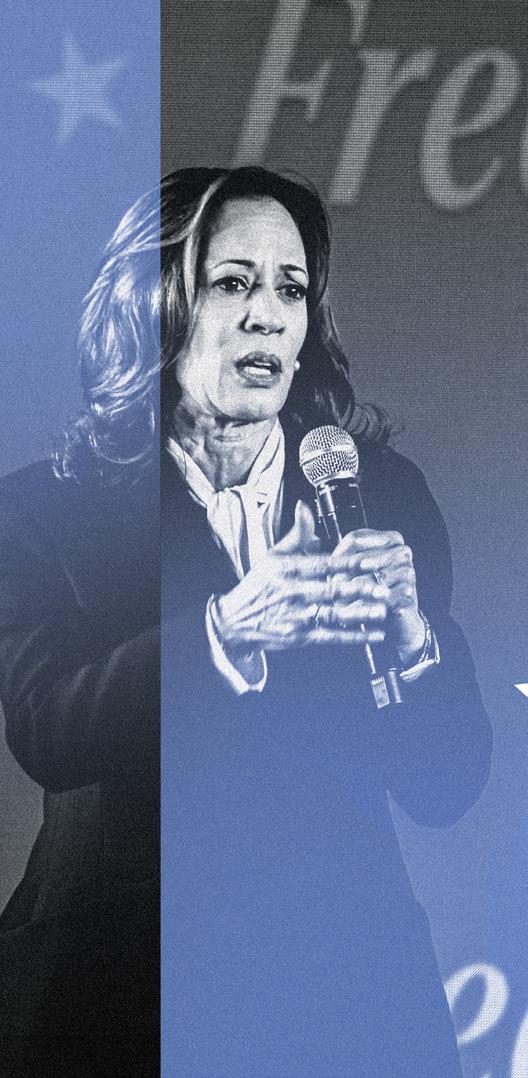
significant membership growth ahead of election
Penn Democrats, College Republicans report significant membership grow th ahead of election
Penn affinity groups discuss the issues shaping their vote on Election Day
Penn in third presidential campaign
YOMI ABDI Opinion Editor
YOMI ABDI Opinion Editor
ASHA CHAWLA Copy Editor
ABHIRAM JUVVADI
CHARLOTTE BOTT Copy Editor
ABHIRAM JUVVADI Photo Editor
DEREK WONG Video Editor
DIAMY WANG Politics Desk Editor
CHENYAO LIU News Photo Editor
Penn Democrats, College Republicans report significant membership grow th ahead of election
Trump, Wharton alumnus, distances himself from Penn in third presidential campaign
Trump, Wharton alumnus, distances himself from Penn in third presidential campaign
Former classmates, fraternity brother of Donald Trump Jr. ref lec t on his time at Penn
Former classmates, fraternity brother of Donald Trump Jr. ref lec t on his time at Penn
Penn Democrats, College Republicans report significant membership grow th ahead of election
Penn’s state rep. discusses handing of College Green encampment, plans for nex t term
Penn’s state rep. discusses handing of College Green encampment, plans for nex t term
Green encampment, plans for next term have gone to Democrats in 2024
Trump, Wharton alumnus, distances himself from Penn in third presidential campaign
99.1% of political donations from Penn faculty have gone to Democrats in 2024
Editorial | Penn needs Kamala Harris
Editorial | Penn needs Kamala Harris
Editorial | Kamala Harris is the best choice for Penn for Harris in Pennsylvania in the 2024 general election?
Selma Farsakh | I’m a Palestinian who voted for Harris in Pennsylvania
Selma Farsakh | I’m a Palestinian who voted for Harris in Pennsylvania
Penn’s state rep. discusses handing of College Green encampment, plans for nex t
Ananya Shah | Why undecided voters should look beyond the headlines
look beyond the headlines their vote on Election Day
99.1% of political donations from Penn faculty have gone to Democrats in 2024
99.1% of political donations from Penn faculty have gone to Democrats in 2024
Ananya Shah | Why undecided voters should look beyond the headlines
Sose Hovannisian | Get yourself to the Pennsylvania polls, one way or another
Former classmates, fraternity brother of Donald 4-5 6-7 8 14 16 18 20 22 9 15 17 19 21 23 10-11
Sose Hovannisian | Get yourself to the Pennsylvania polls, one way or another
Pennsylvania polls, one way or another
YOMI ABDI Opinion Editor
SYDNEY CURRAN Opinion Photo Editor
EMMI WU Deputy Design Editor
ANISH GARIMIDI Deputy Design Editor
DEREK WONG Video Editor
INSIA HAQUE Deputy Design Editor
ABHIRAM JUVVADI Photo Editor
JANINE NAVALTA Deputy Design Editor
Editor
CHENYAO LIU News Photo Editor
KATRINA ITONA Deputy Design Editor
KATRINA ITONA Deputy Design Editor
MAKAYLA WU Design Associate
SYDNEY CURRAN Opinion Photo Editor
MAKAYLA WU Design Associate COVER Photos by Photos by Abhiram Juvvadi and Jackson Ford Design by Emmi Wu
EMMI WU Deputy Design Editor
ANISH GARIMIDI Deputy Design Editor
COVER Photos by Abhiram Juvvadi and Jackson Ford Design by Emmi Wu
INSIA HAQUE Deputy Design Editor
JANINE NAVALTA Deputy Design Editor
KATRINA ITONA Deputy Design Editor
MAKAYLA WU Design Associate
COVER Photos by Photos by Abhiram Juvvadi and Jackson Ford Design by Emmi Wu THIS ISSUE'S TEAM
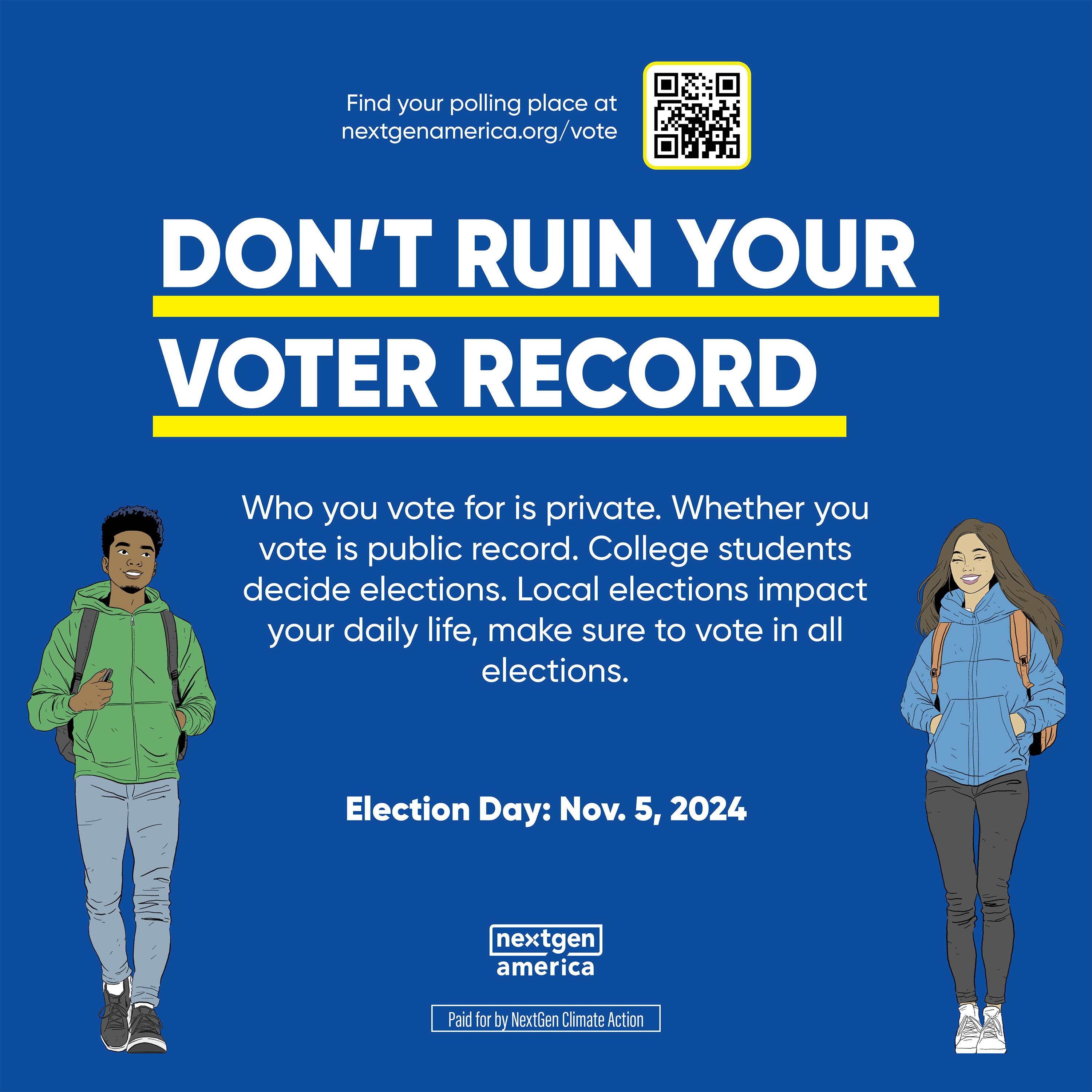
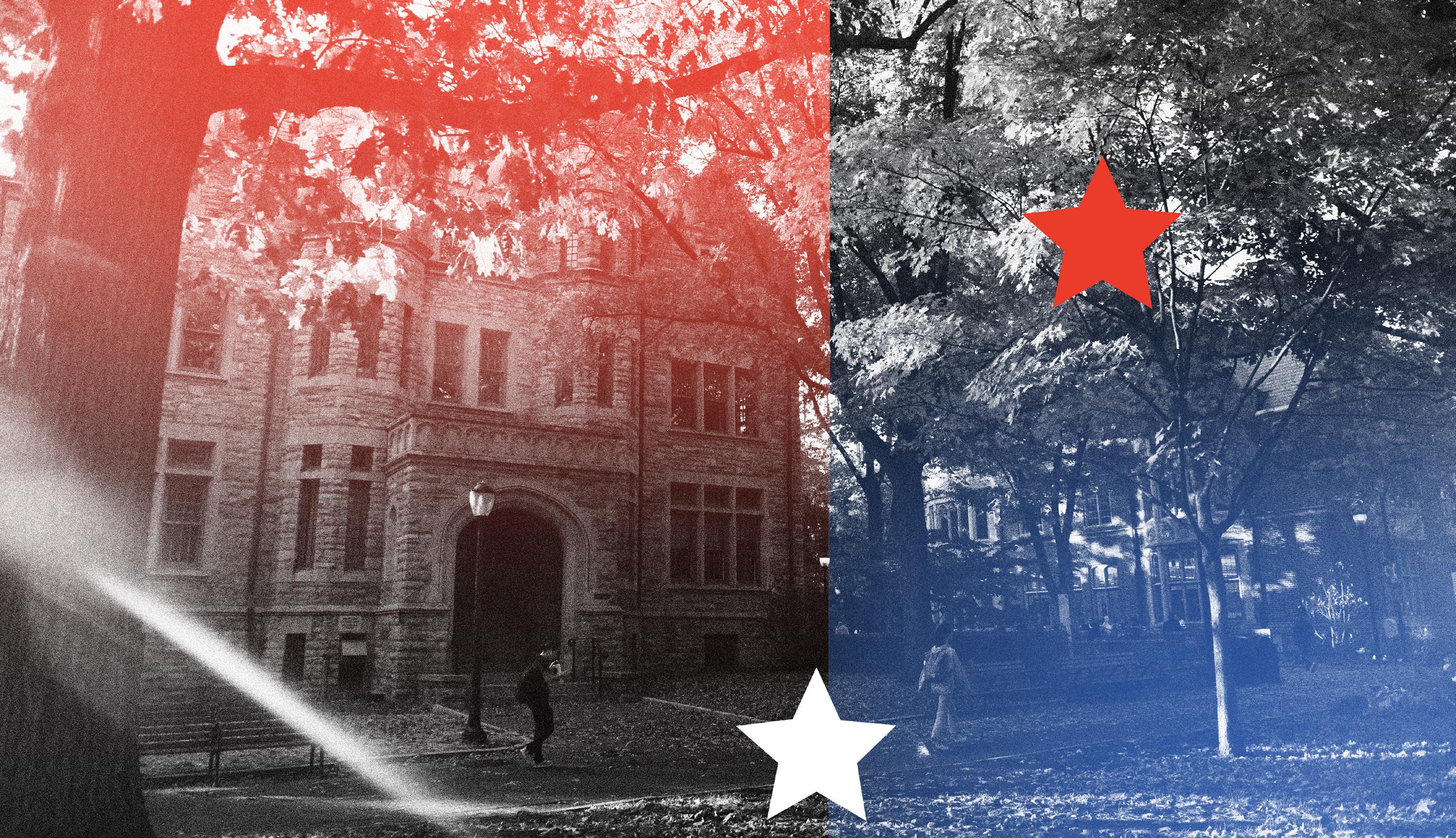
The Daily Pennsylvanian looks at ways in which the 2024 election may shape the lives of members of the Penn community.
The DP spoke with several Penn political groups about the importance of the 2024 election and what they believe is at stake
BY DIAMY WANG | SENIOR REPORTER DESIGN BY INSIA HAQUE
Pennsylvania has emerged as the epicenter of what has shaped up to be a contentious and unprecedented 2024 election cycle.
Both major party presiWharton graduate and former President Donald Trump and Vice President Kamala Harris — have crisscrossed the state several times in the months leading up to Nov. 5. Democratic and Republican candidates up and down the ballot have visited Philadelphia and Penn’s campus in the hopes of courting young voters.
As Election Day approaches, The Daily Pennsylvanian spoke with several Penn political
groups about the importance of the 2024 election and what they believe is at stake.
Following President and former Penn professor Joe Biden’s withdrawal from the presidential race in late July, Harris took his place at the top of the Democratic Party ticket. Trump, the Republican nominee, is on his third campaign for president. As their campaigns have taken shape, sharp divides have emerged between the two candidates’ stances on key national issues.
College junior and Penn Government and Politics Association Vice President of Internal Affairs Sage Mehta told the DP that while
GPA’s members “come from different ideological backgrounds,” many agree on the importance of the 2024 election.
“I think the consensus we’ve seen, pretty much across the board, is that people think that there’s a lot at stake,” Mehta said. “There’s a lot of issues that I think we as college students can see as very pressing, which makes the outcome of this election undeniably important.”
Penn Democrats and Penn College Republicans, the largest partisan political organizations on campus, agreed that immigration and the economy are two national issues that are central to the election.
Specifically, both groups agree that actionable steps
must be taken to address immigration — which is “an issue that affects everyone,” College sophomore and Penn Dems Communications Director Steve Yang said. However, the groups disagreed on who would be best situated to make those changes.
“Trump is more interested in just saying that it’s a massive issue instead of actually solving it,” Yang said.
Conversely, a spokesperson for the College Republicans’ board believes the United States should prioritize “enforcing [its] laws” on immigration.
“We should be a welcoming country, because we are a country of immigrants,” he told the DP. “But there is a huge, huge difference that
the left seems to ignore nowadays between legal immigration — and the fact that we do appreciate different cultures and different people — and illegal immigration, which we should not accept in really any circumstances.”
Yang highlighted abortion, women’s rights, and gun control as additional important issues for Democrats, while the College Republicans spokesperson highlighted a focus on crime.
However, Yang said that the Democrats’ biggest priority is preserving democracy. Election experts have expressed concern that Trump would not accept the outcome of the 2024 presidential election if Harris wins.

“If we have a system where people don’t respect the results of the election, our democracy’s in danger,” he said.
While the presidential race is receiving most of the spotlight, national attention is also trained on the race for one of Pennsylvania’s Senate seats. With the U.S. Senate currently sitting at aocrats, the race between incumbent Sen. Bob Casey fund chief executive officer
decide the Senate’s balance of power.
mines, if Kamala Harris is
we can go forward and pass important legislation that needs to be passed,”
an effective counterweightcratic majority — or very
close to a majority — to desire to expand power.”
that while Casey “used to he has “moved a lot to the left.”
“A lot of political outsiders are trying to come into politics more recently, but sometimes it’s a really good thing, beproblem solver,” he said.tors and state-level politicians can “hit closer
something exemplified by Pennsylvania Gov. Josh Shapiro and U.S. Sen. elections in 2022. -
cials … have visited Penn, been on campus, and I
see how they are sort of impacting us and representing us,” she said. “I aware about the local and the state ramifications of
the election as well.”
their respective parties’ national focuses can have both a wide-reaching and localized impact.
WE NEED TO GET BACK TO THIS ERA WHERE WE RESPECT EACH OTHER AND WE JUST AGREE TO DISAGREE ON OUR POLITICS AND POLICY AND THE WAYS THAT WE WANT OUR GOALS TO BE ACCOMPLISHED. BUT I THINK WE ARE ALL PATRIOTS, WE ALL CARE FOR OUR COUNTRY.
- Penn Dems Communications Director Steve Yang
everyone,” the Collegeperson said. “Having a good economy, having low of good numbers that we numbers disproportionately middle class families, because if you’re a billionaire or a millionaire, it doesn’t matter if the price of gas is $5. But if you’re a middleclass person, that really going to affect people across Pennsylvania — and obviously, in every state in the country.”
importance of ensuring voters’ voices are heard, regardless of their political stance.
us to vote and to use our
“We want to have those
they’re represented at the constituents and members are voting.”
believed that respect was important for political dialogue — especially for conversations about divisive topics.
points of agreement, andress made, if you just really get to the bottom of why these differences exist,”
Yang connected a shared patriotism with the importance of preserving democracy.
to this era where we respect each other and we just agree to disagree on our politics and policy and the ways that we want our goals to be accomplished,” patriots; we all care for our country.”
Asupermajority of Penn students plan on voting for Vice President Kamala Harris in the 2024 presidential election, according to a survey by The Daily Pennsylvanian.
The DP conducted an anonymous student survey from Oct. 11 to Oct. 18 and collected responses from over 900 Penn undergraduates. The survey found that 79% of Penn students plan to vote for Harris in the 2024 presidential election, while 12% of surveyed students plan to vote for former President and 1968 Wharton graduate Donald Trump. The remaining 9% of respondents said they plan to not vote or vote for a third-party candidate.
79% OF PENN STUDENTS PLAN TO VOTE FOR HARRIS
The prospect of another Trump term is a key factor motivating many Penn students to vote for Harris. Several students told the DP that they fear Trump could endanger the future of American democracy.
“To do the utmost to preserve [the democratic
system] would be to vote against Donald Trump,” College senior Jordan Ortiz said. “I think his ability to sow doubt in our electoral process has been demonstrably destructive.”
College and Wharton first year Doer He, who is a DP staffer, expressed a similar point of view. He called Harris “likely the best choice, or at least the less worse of the two choices, in terms of protecting our democracy.”
Across all undergraduate schools, the vast majority of students plan on voting for Harris. Harris’ support is highest among students in the College of Arts and Sciences and the School of Nursing, while Trump’s support is highest among students in the Wharton School and the School of Engineering and Applied Science.
College first year Tareque Chowdhury told the DP he feels inclined to vote for Harris, citing foreign policy as his top issue — and the Russia-Ukraine war in particular. He also described
4% I WOULD NOT VOTE DONALD TRUMP
Tr ump’s suppor t is highest among students in the Wharton School and the School of Engineer ing and Applied Science
BY MAKENZIE KERNECKEL | STAFF REPORTER DESIGN BY JANINE NAVALTA
Harris’ foreign policy as “more refined than Trump’s.”
Alex Guzman, a College senior, feels motivated to vote partially due to Harris’ commitment to creating affordable housing and her openness to a ceasefire in Gaza.
“As a young person, I very much appreciated her discussions on cost of living … and her plans to work with contractors and local governments to build millions of new housing units by the end of her first term,” he said.
When asked about their party affiliation, about six in 10 Penn students identified as Democrat, while one in 10 identified as Republican and two in 10 said that they are independent.
MOST RESPONDENTS TO THE SURVEY WERE DEMOCRATS
67% of respondents who identified as independent said they would vote for Harris. Among Republican students, a majority stood by Trump, but 18% said they plan on voting for Harris. Additionally, 56% of students who identified their party affiliation as “something else” said they will vote for Harris, while 23% do not intend to vote, and 21% plan to support a third-party candidate.
Abortion was the most important political issue for Penn students, with 22% of all respondents selecting it as the issue that matters most to them right now. “Threats to democracy” at 20% and inflation at 19% were the other
top issues for Penn students. 83% of students who said that abortion was their top issue identified as women.
ABORTION WAS THE TOP ISSUE FOR PENN STUDENTS, WITH INFLATION MORE IMPORTANT AMONG REPUBLICANS
Among students who plan on voting for Harris, abortion was similarly the most popular issue at 26%, followed by “threats to democracy” at 24%. On the other hand, 48% of students planning to vote for Trump marked inflation as their most pressing issue.
College first year Kaison Wills said they are voting for Harris to protect their reproductive rights and the
“I feel that it is my right to choose what I do with my body,” Wills said. “I am also voting to protect my identity as a nonbinary individual because I know that the Republican Party does not have the brightest sights for people in the LGBTQ community.”
They said it was important to have a president who
especially for those living in conservative areas like their hometown of Johnstown, Pa.
Penn students show stronger support for Harris compared to the broader Generation Z population — of whom only 50% said they would vote for Harris in the election, according to an August NBC News poll. Students also show a different distribution of issue priorities.
Abortion was students’ top issue, while respondents in the Gen Z survey listed inflation as their top issue by a 20% margin.
Marc Trussler, the director of data sciences at Penn’s Program on Opinion Research and Election Studies, helped conduct the NBC poll and said that Penn’s results are “way more pro-Harris than 18-to-29 year olds generally.”
Higher-than-average family incomes at Penn and the overall college environment may explain why Penn student respondents placed less of an emphasis on inflation as a top concern, Trussler said.
“I think it’s fair to say, on average, Penn students come from a higher income background than most Gen Z people … and being in college, you’re a little bit insulated from the economic conditions,” Trussler said. “You don’t have the same kind of bills and grocery shopping shocks.”
A MAJORITY OF PENN STUDENTS ‘STRONGLY APPROVE’ OF JOE BIDEN’S DECISION TO DROP OUT OF THE PRESIDENTIAL RACE
Despite partisan differences, 92% of Penn undergraduates said they approve of President Joe Biden’s decision to drop out of the presidential race, including 72% who strongly approve. Furthermore, 79% of respondents who said they are Democrats strongly

approved of the decision.
“Clearly, this is a very proDemocratic group of people, and they want to win … they perceive that the switch from Biden to Harris has increased the odds of a Democrat being in the White House,” Trussler said.
MOST TRUMP VOTERS DISAPPROVE OF CAMPUS PRO-PALESTINIAN ACTIVISM, WHILE MOST HARRIS
VOTERS APPROVE
Opinions on campus activism at Penn were split across party lines. 61% of Trump voters at Penn expressed strong disapproval of pro-Palestinian activism on campus. Harris voters were more split on the issue, with 36% somewhat approving and 28% expressing strong approval. Overall, a narrow majority of students, 57%,
said that they somewhat or strongly approve of pro-Palestinian activism on campus.
“There’s a lot of people at Penn who hold a lot of different, diverse views,” Ortiz said. “I think the first step to making [our political environment] a more healthy, hospitable place is to take a second, talk to your friends, talk to your family … understand other people’s views that are different from your own. That’s the key, I think, to a healthy democracy.”
The Daily Pennsylvanian’s 2024 student voter survey of 902 undergraduate students was conducted online using Qualtrics from Oct. 11 to Oct. 18. A structured questionnaire was used to collect data and all responses were self-reported. The sample
was collected independently by the DP and non-probability sampling methods were used. The survey link was distributed through announcements from professors, student-to-student communication, Instagram, and the DP Daybreak newsletter. Although the traditional margin of error for a sample size of 902 is plus or minus 3.3 percentage points, this non-random sample likely carries a higher margin of error. The findings may not be generalizable to all Penn students.
The survey was weighted by the DP using the R “anesrake” package. First, the sample was checked for quality. We dropped 121 responses to only include verified undergraduate students and non-duplicate responses.
Second, the sample was weighted to match race, gender, class year, and school targets for Penn undergraduates. The targets for these variables were collected from two sources. Race and gender target estimates come from Penn’s -
timates come from MyPenn,
the University’s alumni network app. Interviews were conducted by reaching out to respondents who indicated their willingness to participate in a follow-up and provided their contact information on the survey. Those who responded to interview requests were included in the article on a first-come, first-served basis.

Ear
BY ELEA CASTIGLIONE AND VIVI SANKAR | SENIOR REPORTER AND STAFF REPORTER DESIGN BY EMMI WU
On-campus partisan political student groups have reported an increasing difficulty in registering events amid Penn’s move to limit University statements on political events.
Penn College Republicans and Penn Democrats, the University’s largest partisan political organizations, told The Daily Pennsylvanian that they have faced difficulties registering events on campus. Penn’s temporary open expression guidelines, which were implemented over the summer, have increased requirements for registering events — even as Penn’s recently adopted policies to move the University toward institutional neutrality are intended to decrease involvement in political affairs.
A University spokesperson hosting political candidates on
ganization, we have always had to abide by IRS regulations preventing the University from supporting, or appearing to they continued.
In a statement to the DP, a College Republicans spokesperson said that the club has faced difficulties in scheduling venues to host events, and that the University has denied its requests due to a lack of room for potential protesters to demonstrate.
“On multiple occasions, we have gone to great lengths to host events that align with the values of open debate and intellectual diversity,” the spokesperson wrote. “With the support of some non-profits, we offered to cover all costs only to be denied access to spaces for reasons that, in our view, seem contrived.”
The spokesperson cited a recent instance in which the club attempted to bring a
candidate for United States senator for an open question and answer session.
“Our experiences demonstrate a troubling pattern where our attempts to host diverse, conservative speakers — intended to foster dialogue, open discussions, and provide students with a wider array of perspectives — have been obstructed by University policies and selective bureaucratic barriers,” they wrote.
College Republicans recently hosted a fireside chat with U.S. Senate candidate Dave McCormick, who is a Republican, off campus at Two Locals Brewing on Oct. 23.
Similarly, Penn Dems has also reported hurdles in booking events this semester.
According to the group, it was denied a campus room for a phone bank, and University attorneys directed the club to take “unnatural steps” to make a speaking event nonpartisan.
“While we may understand
Solidarity Encampment during
the University instituted a set of temporary open expression guidelines, which contained guidance on “when, where, and how open expression can
Penn President Larry Jameson also announced guidelines that limit the University from making public statements on political issues or events that do not directly impact the University.
The Temporary Standards and Procedures for Campus Events and Demonstrations, which were instituted over the summer and are still in effect, outline new requirements for demonstrations, including mandatory reservations for outdoor spaces two weeks in advance, prior approval for events during business hours, and a prohibition on overnight occupations.
The guidelines — though intended to clarify protest policies — contain ambiguities, loopholes, and contradictions, according to a DP analysis. The guidelines explicitly ban encampments and expand the authority of the vice provost for University Life, but vague definitions and unclear restrictions raise questions about their ability to be enforced and consistency with Penn’s longstanding open expression commitments.
the University’s policies, we hope they don't interfere with Penn Dems’ mission and our work to increase the political engagement of Penn students,” a Penn Dems spokesperson wrote in a statement to the DP.
On the other hand, Penn Leads the Vote, a nonpartisan, student-run organization that aims to foster a culture of civic engagement on Penn’s campus, told the DP that it has not experienced any issues organizing events.
“This could be due [to] PLTV’s status as a nonpartisan organization, but, overall, we’ve been really happy with the level of engagement and support we’ve received from faculty, students, and the Penn community as a whole as the election approaches!” a spokesperson for the group wrote to the DP.
After pro-Palestinian activism and the establishment of Penn’s Gaza
The new guidelines make it more difficult for groups — including student organizations — to organize on campus. According to a series of interviews with Penn faculty members, organizers of the Palestine Writes Literature Festival would face significant obstacles if they were to return to Penn due to stricter rules on event planning and campus access.
In particular, these guidelines limit attendance by default to Penn community members and restrict the presence of unaffiliated individuals, making large-scale events, specifically those involving external speakers or open attendance, more difficult to organize.
“We advocate for an environment where a broad spectrum of views can be heard and evaluated by students,” the College Republicans spokesperson wrote. “Open, peaceful exchanges should not be dismissed due to ideological differences, especially at an institution dedicated to education and intellectual growth.”
The University has become a focal point in debates around elite inf luence, free expression, and the role of higher education in society
BY JASMINE NI | SENIOR REPORTER
DESIGN BY EMMI WU
enn has often been at the center of the political landscape throughout the past year — one which has been fraught with campus demonstrations, congressional investigations, and a shifting presidential election campaign.
PAs scrutiny from national media and legislators has surged during this time, the University has attracted attention in debates around elite influence, free expression, and the role of higher education in society. These conversations have increased in importance and frequency in the context of several high-profile political figures with strong ties to the University — most notably, 1968 Wharton graduate Donald Trump and former Penn professor President Joe Biden. Penn has also drawn criticism and media attention for affiliated institutions such as the Penn Wharton Budget Model and Penn Biden Center.
TRUMP AND BIDEN
Trump has often referred to his Ivy League credentials — particularly his status as an alumnus of the Wharton School — on the campaign trail. While Trump has distanced himself from this aspect of his record and mentioned his Wharton education less during this campaign season, he has done so in contexts more pertaining to economic policy and business acumen.
Throughout the past election cycle, Trump — as has been the case for much of his career — has been involved in much political discourse and controversy.
In late 2023 and early 2024, Trump was disqualified from several states' primary election ballots after they ruled him ineligible due to his role in inciting an insurrection on the Capitol. In March, the United States Supreme Court unanimously
ruled to allow Trump to appear on Colorado and Maine primary ballots, overturning the previous Colorado Supreme Court decision.
In July, Trump's legal woes continued as he was convicted on 34 felony counts for falsifying business records tied to a hush-money payment to adult film star Stormy Daniels during his 2016 campaign, marking the first time a former U.S. president has been found guilty of a crime.
The same month — following a performance in June's presidential debate widely panned by viewers and media his decision to withdraw from the presidential race, citing his commitment to serving the remainder of his term and endorsing Vice President Kamala Harris as the Democratic nominee. A few months later, Biden expressed his desire to reengage with the Penn Biden Center after his term, building on his prior involvement with the think tank.
Biden has also been embroiled in controversy over classified documents from his vice presidency which were discovered at the Penn Biden Center in November 2022, prompting an investigation by the Department of Justice.
The House Oversight and Accountability Committee soon opened an investigation into the Penn Biden Center, requesting data on foreign donations, particularly from China, and lists of visitors and employees, citing concerns about foreign influence and potential access to classified materials. Penn, in response to these allegations, said that the center received no foreign funds and affirmed compliance with federal reporting laws on foreign donations.
Special Counsel Robert Hur was also assigned in early 2023 to examine the origins and handling of these documents.
Despite finding that Biden
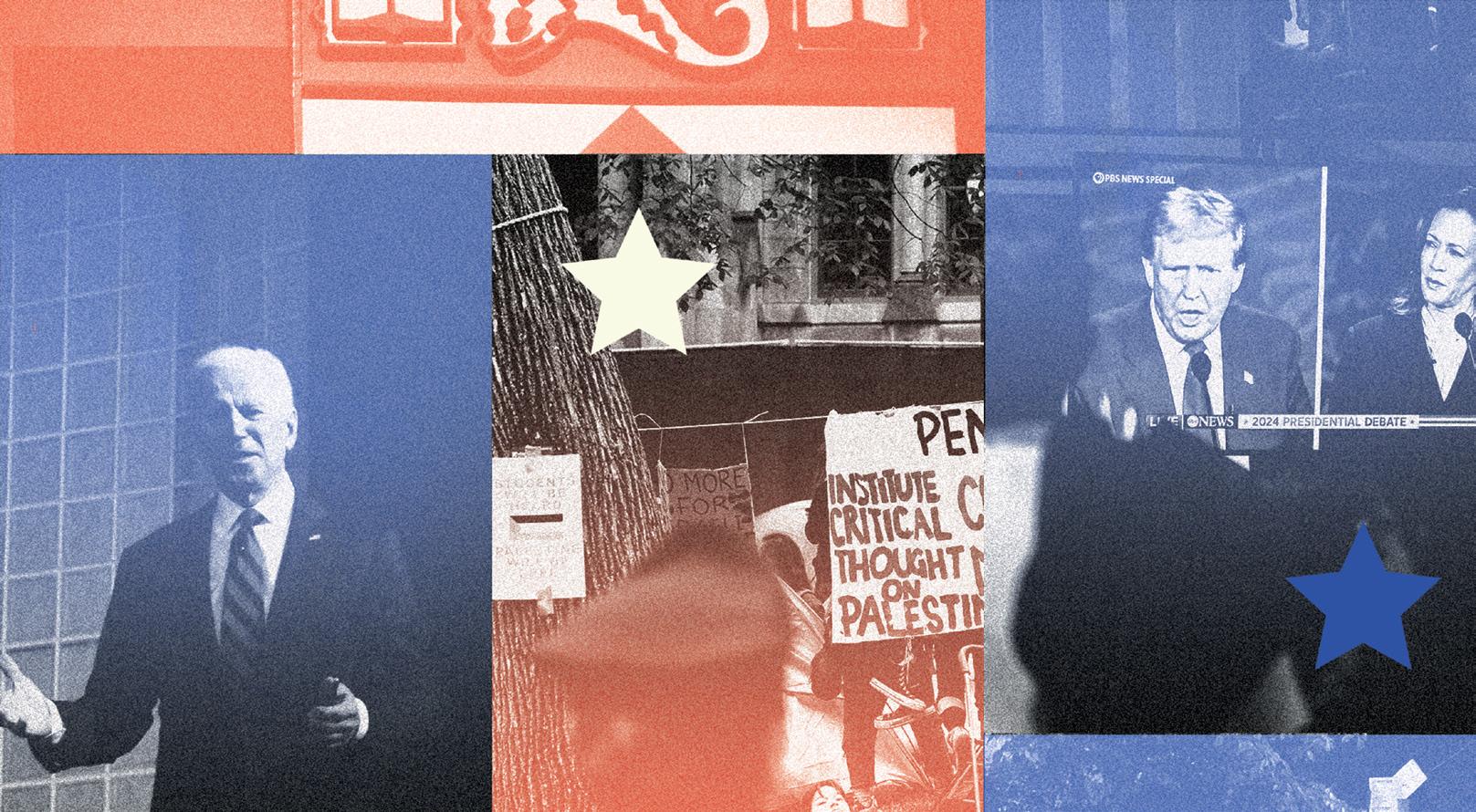
had “willfully retained” classified information, Hur’s report, released in February 2024, concluded there was insufficient evidence to prosecute, partly due to Biden’s full cooperation and his perceived lack of malicious intent. Hur also critiqued Biden's mental acuity in the report, saying that he would appeal to a jury as a “sympathetic, well-meaning, elderly man with a poor memory.”
In recent months, Penn Wharton Budget Model — a nonpartisan initiative launched by Wharton — has been a subject of significant dispute and discussion in the presidential campaign. PWBM released an analysis indicating that Trump’s 2024 economic policy proposals would significantly increase the federal deficit. This assessment was referenced by Harris during her September debate with Trump, who argued that the GOP nominee’s plan would inflate the national deficit by an estimated $5.8 trillion over the next decade.
Trump responded by citing his Penn background, claiming support from Wharton’s “top professors” for his plans. The analysis was similarly referenced by both candidates during the vice presidential debate.
Penn has also found itself at the epicenter of a national debate over free speech and student activism following the Oct. 7, 2023 Hamas attacks on Israel and the ensuing Israel-Hamas War. Campus demonstrations throughout fall 2023 attracted national attention over alleged antisemitism on Penn’s campus
and bipartisan scrutiny over the University's response to it.
Penn’s administration attempted to clarify its commitment to free expression in response to the controversy, but criticism continued to escalate until a Dec. 5, 2023 hearing in which former Penn President Liz Magill testified before Congress. Magill received substantial criticism for an interaction with Rep. Elise
Magill said that whether calls for the genocide of Jews constitute violations of Penn's code of conduct is "context dependent."
Criticism of Magill intensified in the following days, including dozens of congresspeople calling for Magill's removal in separate letters and a House committee opening an investigation into Penn with the threat of subpoenas. Magill resigned the presidency on Dec. 9, 2023.
At least three federal bodies, including the House Committee on Education and the Workforce, the House Oversight Committee, and the Department of Education, opened investigations around this time into Penn’s handling of antisemitism on campus, including whether the University upheld its obligations under Title VI of the Civil Rights Act.
The House Committee on Education and the Workforce was the first to do so, initiating a formal investigation into Penn and peer institutions in December 2023 following Magill's testimony. The House Ways and Means Committee joined in January 2024, threatening the University’s tax-exempt status due to alleged negligence in safeguarding Jewish students on campus.
requested detailed policies and questioned whether Penn’s diversity, equity, and inclusion programs effectively support Jewish students.
In late December 2023, the Pennsylvania House of Representatives withheld $31 million in funding for the University's School of Veterinary Medicine over concerns of antisemitism. While the Commonwealth later allocated Penn funding in the
University has still not received the initial funding withheld in late 2023.
Four months later, the House expanded its probe into antisemitism on college campuses, with Speaker of the
announcing a House-wide investigation. Johnson emphasized Congress's duty to ensure a safe educational environment for Jewish students, citing concerns over alleged “ongoing and pervasive acts of antisemitic harassment and intimidation” on campus.
The broadened investigation explored the University’s federal fund usage and campus policies through the respective jurisdictions of six congressional committees and remains active to date.
Amid summer preparations for the academic year, the Education and Workforce Committee and Ways and Means Committee sent a letter in August 2024, urging Penn to reinforce measures against potential campus disruptions and antisemitic conduct. The letter warned of upcoming demonstrations likely to resurface, pressing Penn to update policies to effectively handle such occurrences.
Ahead of Election Day, The Daily Pennsylvanian has compiled a comprehensive ballot guide to all of the candidates — national and local — on the ticket, along with where you can go on campus to vote for them on Tuesday, Nov. 5.
The deadline to register to vote has already passed in Pennsylvania, but voters can check their registration status here.
Applications for a mail-in or absentee ballot are still open and must be received by the voter's county election office
case of an emergency, voters may be able to request an emergency absentee ballot.
Mail-in ballots must be received — not simply postmarked — by the county election office on Nov. 5 at 8 p.m. to count.
Voters can cast their ballots on Penn's campus from 7 a.m. to 8 p.m. on November 5.
Students living in Kings Hill College Houses, as well
the Quad and Stouffer Hall in Stouffer College House can Houston Hall.
Students living in Harnwell, Bois, and Gutmann College Houses; Mayer Hall in Stouffer College House; the Axis, thenut Hall, Hamilton Court, the Hub on Chestnut, or 3737 Chestnut can vote in Bodek
Students living in The which is located at 4125
Students living in other offcampus housing can check the location of their polling place here.
PRESIDENT OF THE UNITED STATES
The race for the presidency has drastically changed over the past several months.
The Penn community w ill be voting on races up and down the 2024 general election ballot
BY DIAMY WANG AND ANUSHA MATHUR | SENIOR REPORTER AND STAFF REPORTER DESIGN BY JANINE NAVALTA
President Joe Biden, a former Penn professor and the former presumptive Democratic nominee, withdrew from the campaign in late July after his widely criticized performance in the first presidential debate of the cycle. Now, 1968 Wharton graduate and former President Donald Trump is facing Vice President Kamala Harris — the first woman of color to lead a major party ticket — as his Democratic opponent. Pennsylvania is expected to
be critical in determining the victor of the election, and was classified as "the presidential election's most important state" by The Brookings Institution earlier this month.
KAMALA HARRIS (D)
Harris, who was widely viewed as more socially progressive than Biden prior to receiving the Democratic nomination for president, has since moved toward the political center and aligned herself more closely with
Biden’s platforms of advancing climate policy, health care, reproductive rights, and social justice reform. Prior to assuming the vice presidency, Harris served as a U.S. senator from California from 2017 to 2021 and as attorney general of California from 2011 to 2017.
Harris’ running mate is Democrat Minnesota Gov. Tim Walz. Pennsylvania Gov. Josh Shapiro, an ex-officio member of the University Board of Trustees, was also in serious contention for
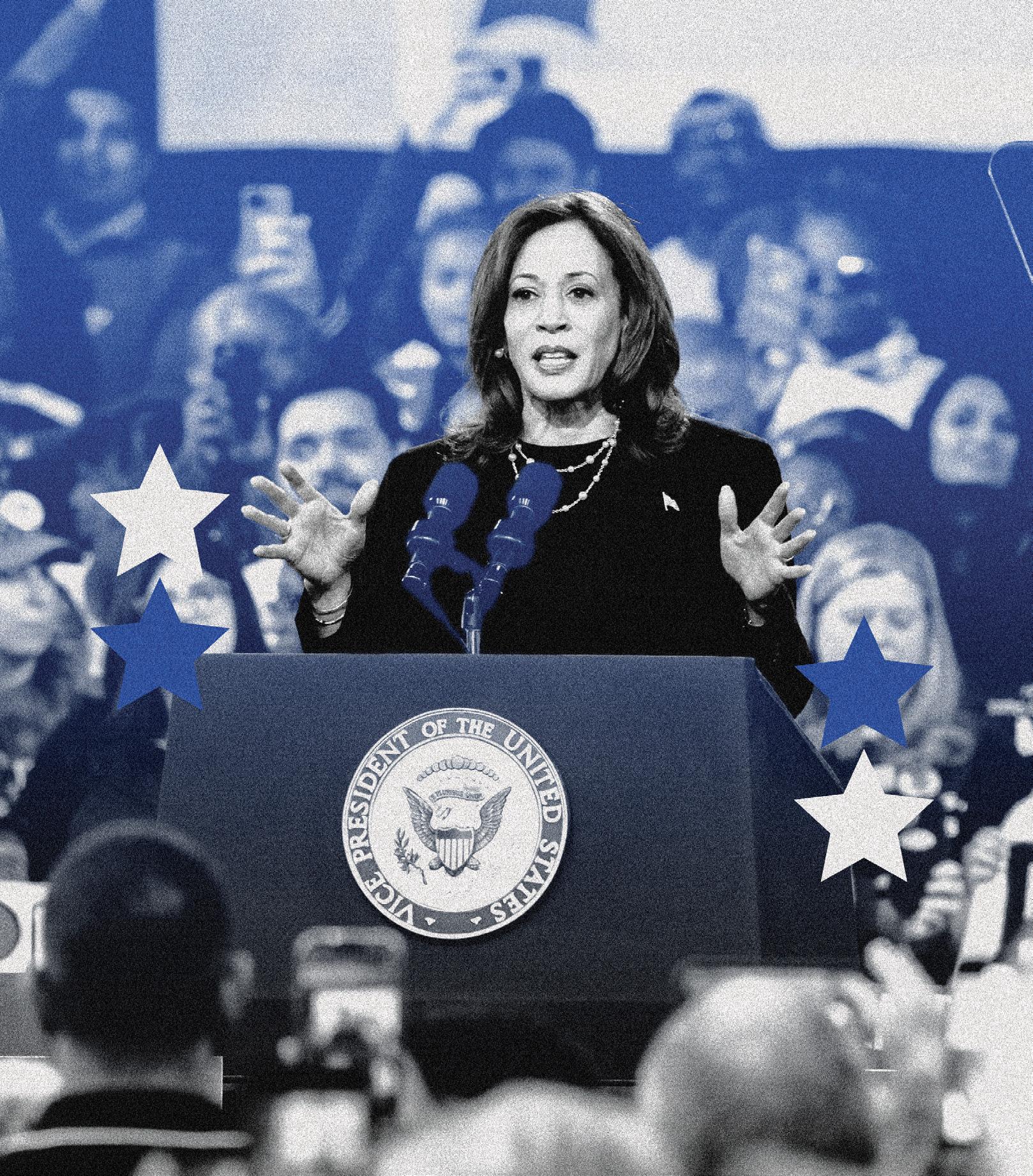
the position.
Penn Democrats endorsed Harris shortly after she announced her candidacy.
DONALD TRUMP (R) Trump, who graduated from the Wharton School in 1968, is seeking his second term as president after his first from 2016 to 2020. He continues to focus on priorities from his previous administration, such as border security, “America First” trade policies, and economic growth through tax cuts and deregulation. Trump holds conservative stances on immigration, foreign policy, and social issues, positioning himself as a change from what he characterizes as ineffective Biden-era policies.
Trump’s running mate is has served in the U.S. Senate since 2023.
Environmental lawyer an independent presidential candidate until August, when he suspended his campaign and endorsed Trump. He ran on a platform critical of mainstream media, government institutions, and vaccines. Kennedy does not appear on the ballot in Pennsylvania.
Jill Stein, the Green Party candidate, is known for her focus on climate action, anticorporate influence, and her stance against the United States’ influence in the IsraelHamas War. Stein’s running mate is 2004 Penn Ph.D. graduate Butch Ware.tarian Party candidate, is running on a platform of less government interference and market-driven solutions.
The race between Sen. BobCormick could determine whether Democrats maintheir majority in the Senate, which currently consists of 51 Democrats and Democrataligned independents and
The race is currently classified by the nonpartisan Cook
A moderate Democrat who has served as a U.S. Senator
for Pennsylvania since 2007, Casey — whose family has a longstanding influence in Pennsylvania politics — is campaigning on a platform aimed at supporting the Commonwealth's working class, affordable healthcare, Social Security and Medicare, and job opportunities in clean energy. Casey has supported organized labor throughout his time in the Senate.
Casey has made several appeals to young voters while on the campaign trail and mentioned the Penn Wharton Budget Model during a September campaign event.
DAVE MCCORMICK (R)
McCormick, a former CEO of Bridgewater Associates and hedge fund manager with a military background, presents himself as a business-savvy candidate who can strengthen Pennsylvania's economy. He advocates for lower taxes, limited government, and fewer regulations. He has criticized Casey’s alignment with national Democratic policies — particularly around energy regulations, which he argues harm Pennsylvania’s energy sector.
Penn College Republicans and American Conservation Coalition Action hosted an event with McCormick on Oct. 23 near Penn’s campus, focusing on his stances on climate and energy policy.
PENNSYLVANIA ATTORNEY
GENERAL
The state attorney general is Pennsylvania’s top prosecutor and responsible for enforcing the state’s laws, investigating corruption, and protecting consumers.
EUGENE DEPASQUALE (D)
DePasquale, who served as the Pennsylvania auditor general from 2013 to 2021 and in the Pennsylvania House of Representatives previously, currently works as an adjunct professor at the University of Pittsburgh. His campaign is focused on transparency, consumer protection, and environmental protection. In 2020, DePasquale was the Democratic candidate in Pennsylvania’s 10th congressional district against incumbent Rep. Scott Perry the race.
His campaign has emphasized his record on government accountability, work on addressing the opioid crisis, and background in protecting consumers from corporate malfeasance. DePasquale beat out four other competitors for the Democratic nomination.
DAVE SUNDAY (R)
As the current district attorney of York County since 2018, Sunday’s platform includes criminal justice reform, enhancing support for victims of violent crime, and prioritizing public safety. He is experienced with violent crime cases and, in his campaign, highlights his work on issues like the opioid crisis — one of his top priorities — and human trafficking. In 2013, he was appointed a special U.S. attorney for the Middle District of Pennsylvania.
GENERAL
MALCOLM KENYATTA (D)
Kenyatta has represented the 181st district in the Pennsylvania House of Representatives in Philadelphia since 2019. A progressive Democrat, he advocates for greater fiscal responsibility, economic justice, and state accountability. He has been vocal on issues like increasing the minimum wage and expanding public health funding and transparency in government spending. Kenyatta was a Democratic candidate in the 2022 U.S. Senate primary in Pennsylvania, but lost to current Sen. John
TIM DEFOOR (R)
DeFoor is the incumbent auditor general and has served in the position since
2021. His campaign emphasizes efficiency in government operations, fiscal conservatism, and combating wasteful spending. He is also focused on rooting out fraud and inefficiencies in state agencies. Prior to serving as auditor general, he was the comptroller of Dauphin County.
PENNSYLVANIA STATE TREASURER
The state treasurer is responsible for investing billions of dollars on behalf of the state. The treasurer pays all of the state’s bills and disburses funds to school districts, state agencies, and more.
ERIN MCCLELLAND (D)
McClelland, a business consultant with experience in healthcare and small business management, is focusing on modernizing the state treasury, promoting investment
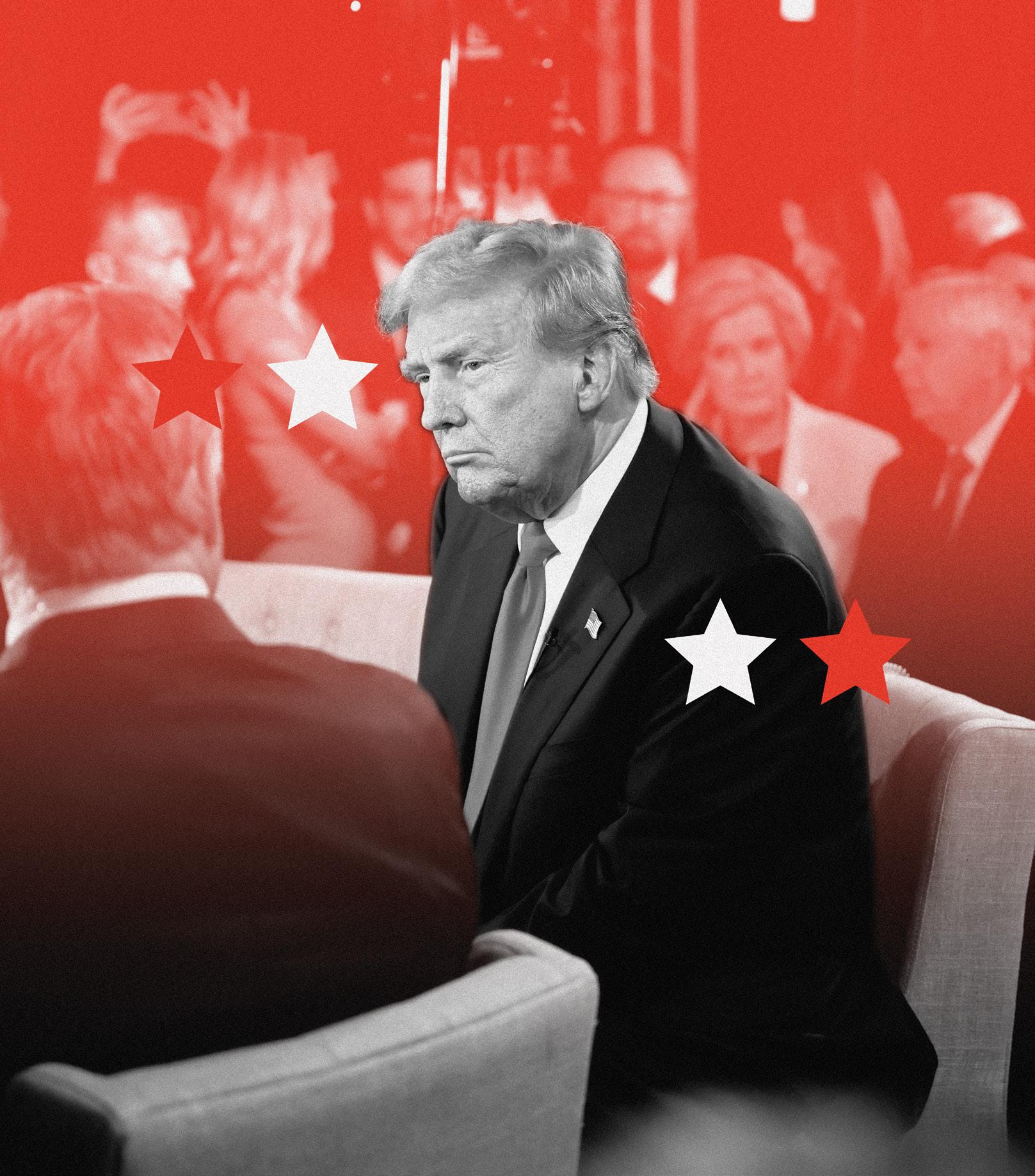
in local communities, and increasing financial literacy among Pennsylvanians. Her approach also emphasizes innovation and investment in infrastructure and education. McClelland prevailed over the state Democratic party — in a closely contested primary.
STACY GARRITY (R)
The incumbent state treasurer with a military background, Garrity focuses on her record maintaining financial stability and transparency in state finances. She has worked on initiatives to increase transparency for Pennsylvania’s finances and to return unclaimed property, and advocates for conservative fiscal policies.
DWIGHT EVANS (D)
Evans, the unchallenged incumbent, is seeking his fifth term in the U.S. House of Representatives. He previously served for 36 years in the Pennsylvania House of Representatives. He suffered a minor stroke in May, but said it would not impact his long-term ability to carry out his duties as a member of Congress.
VINCENT HUGHES (D) AND ANTHONY WILLIAMS (D)
Penn is represented by two state senators: Vincent Hughes and Anthony Williams. Hughes has served in the state Senate since 1994 and is running unopposed for reelection. Williams, who is also running unopposed for reelection, has served in the state Senate since 1998.
RICK KRAJEWSKI (D)
Krajewski, a 2013 Penn Engineering graduate, has served in the state House since 2021 and is running for reelection unopposed. He holds progressive viewpoints on issues like workers’ rights and criminal justice reform. In the spring, Krajewski criticized Penn’s handling of the Gaza Solidarity Encampment.
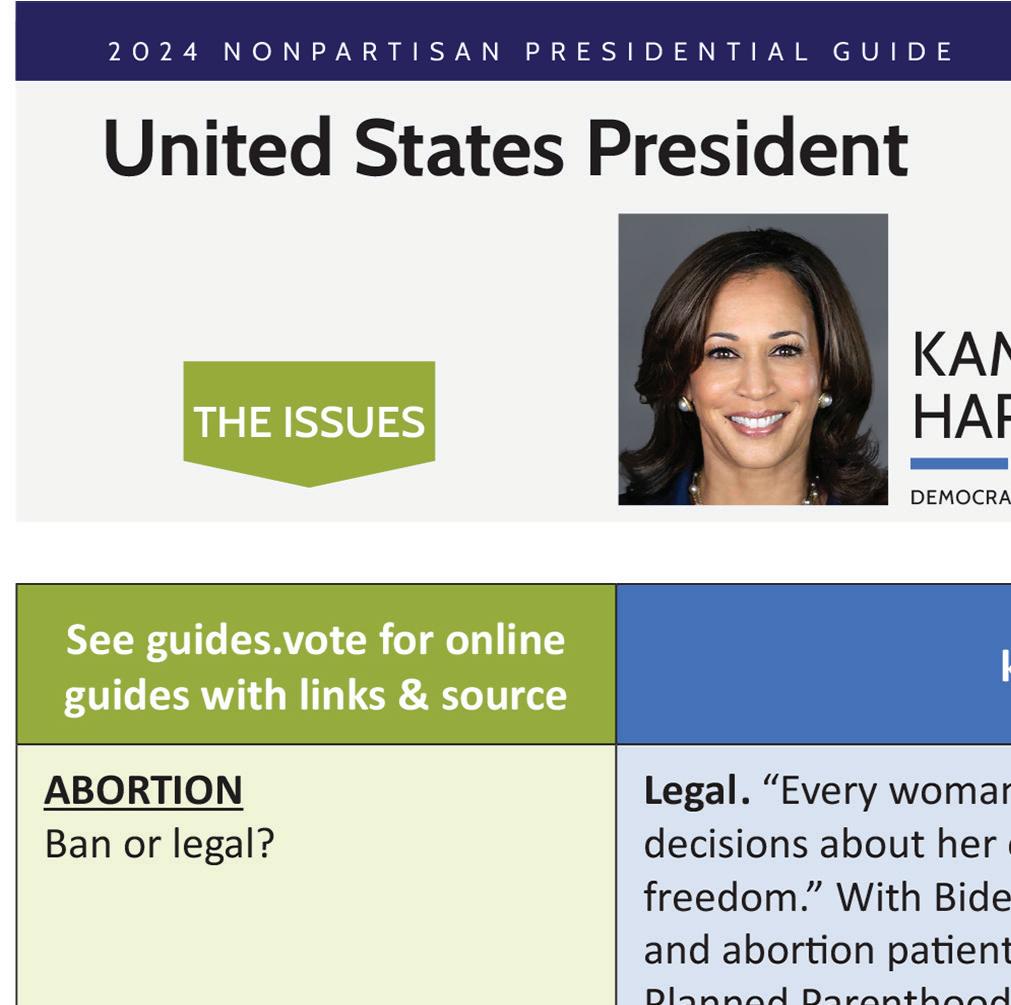

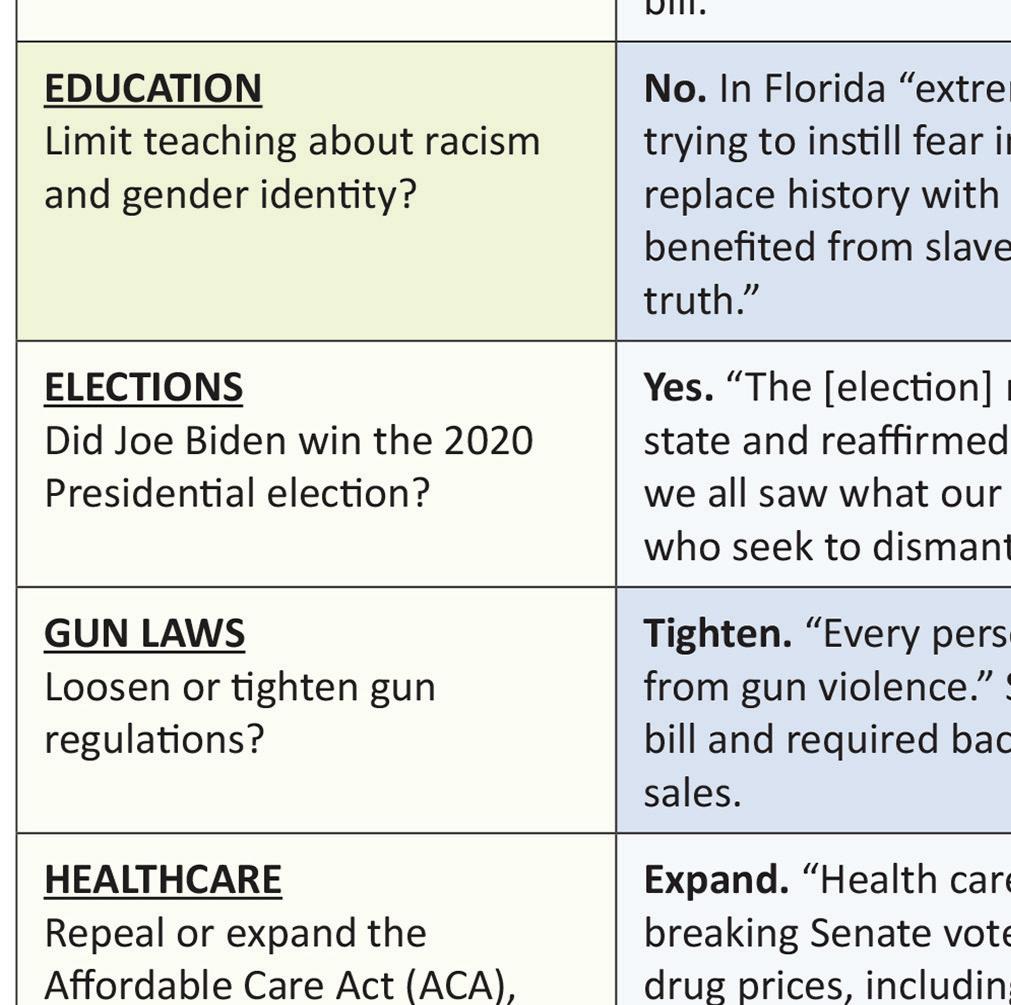







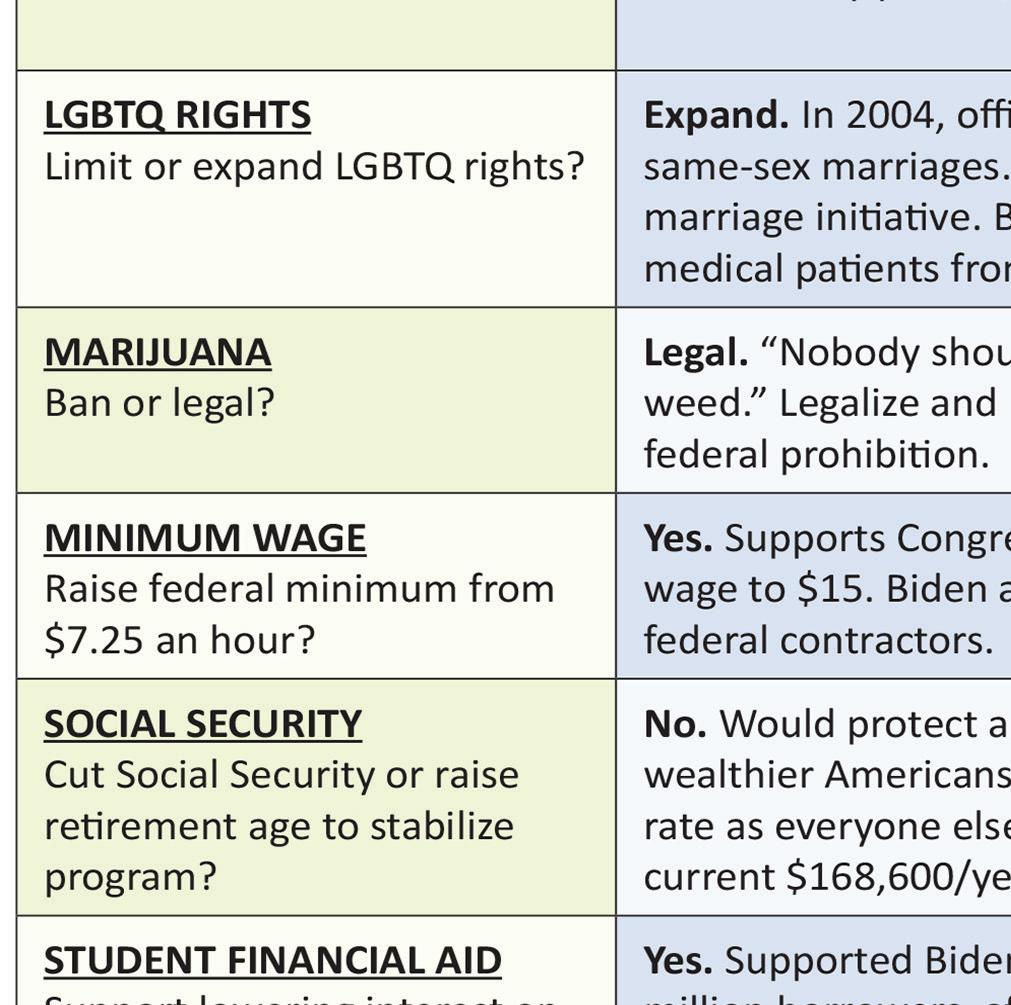
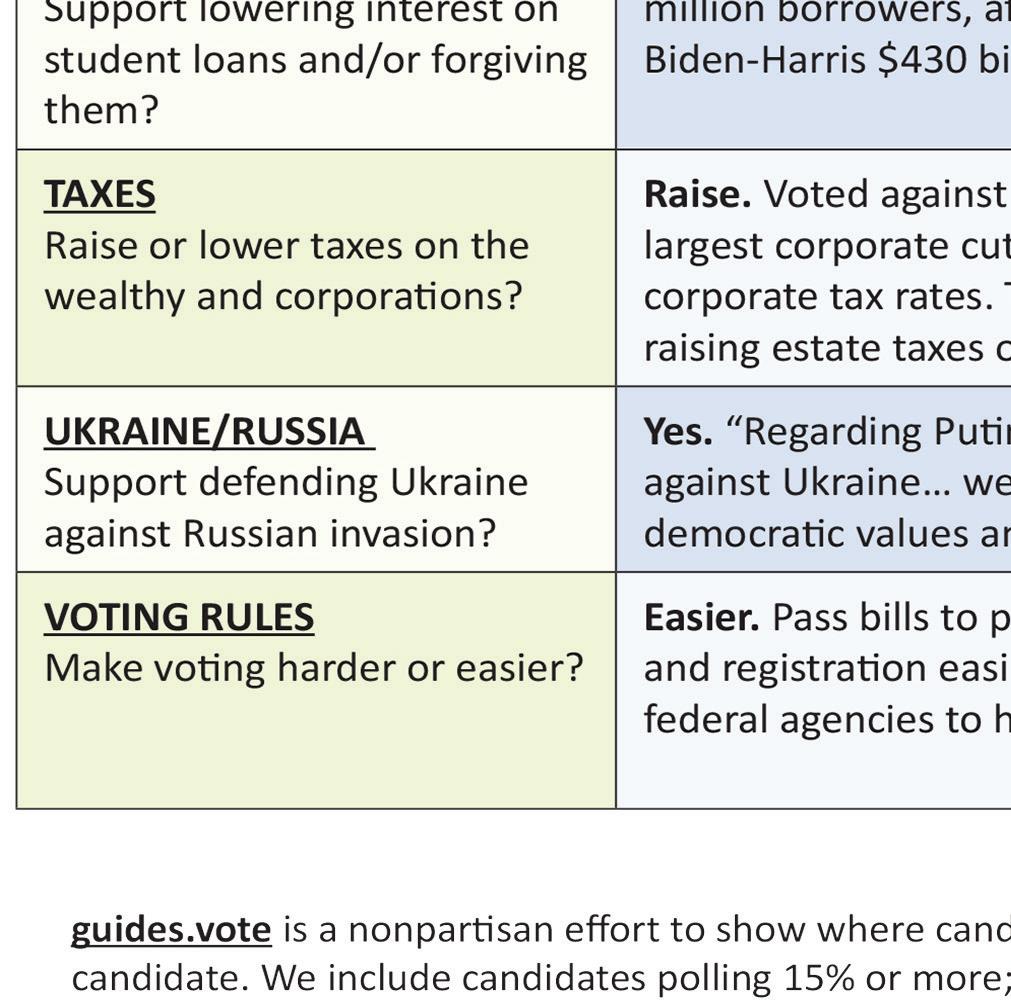
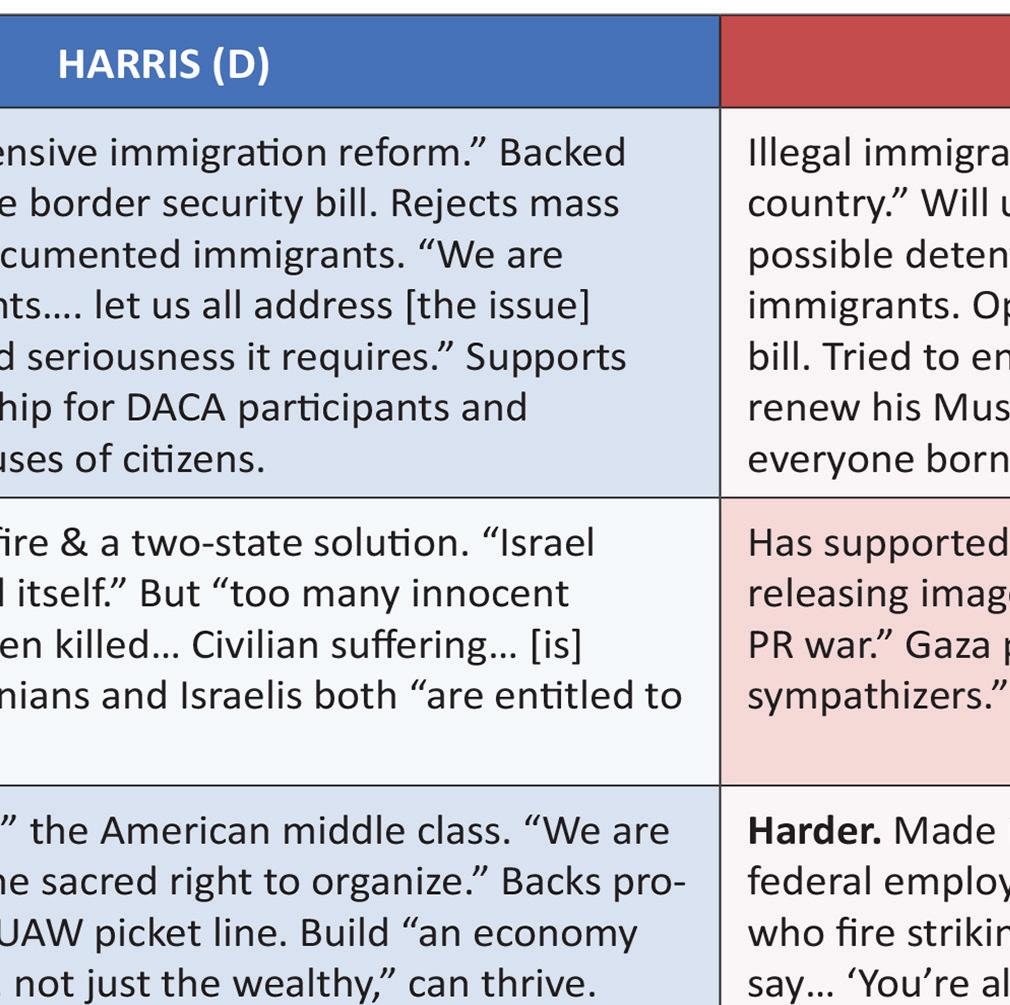
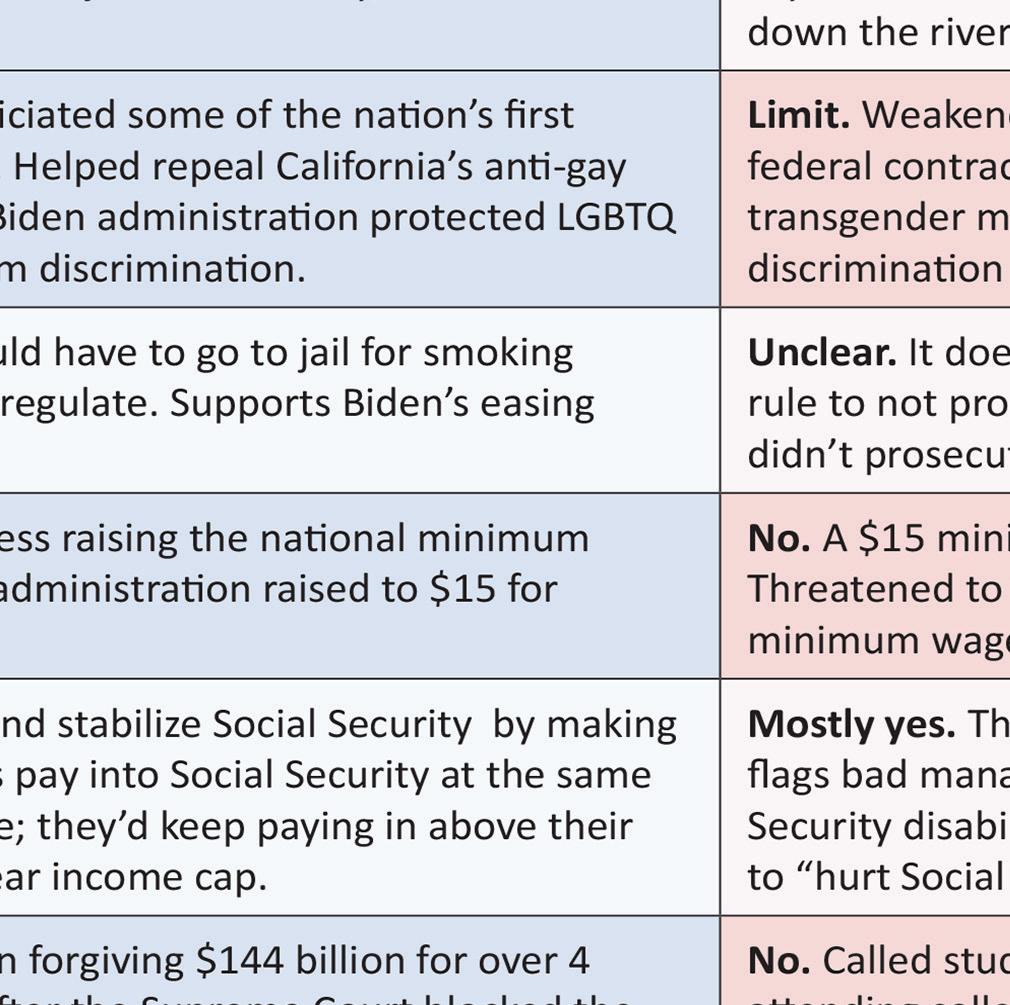
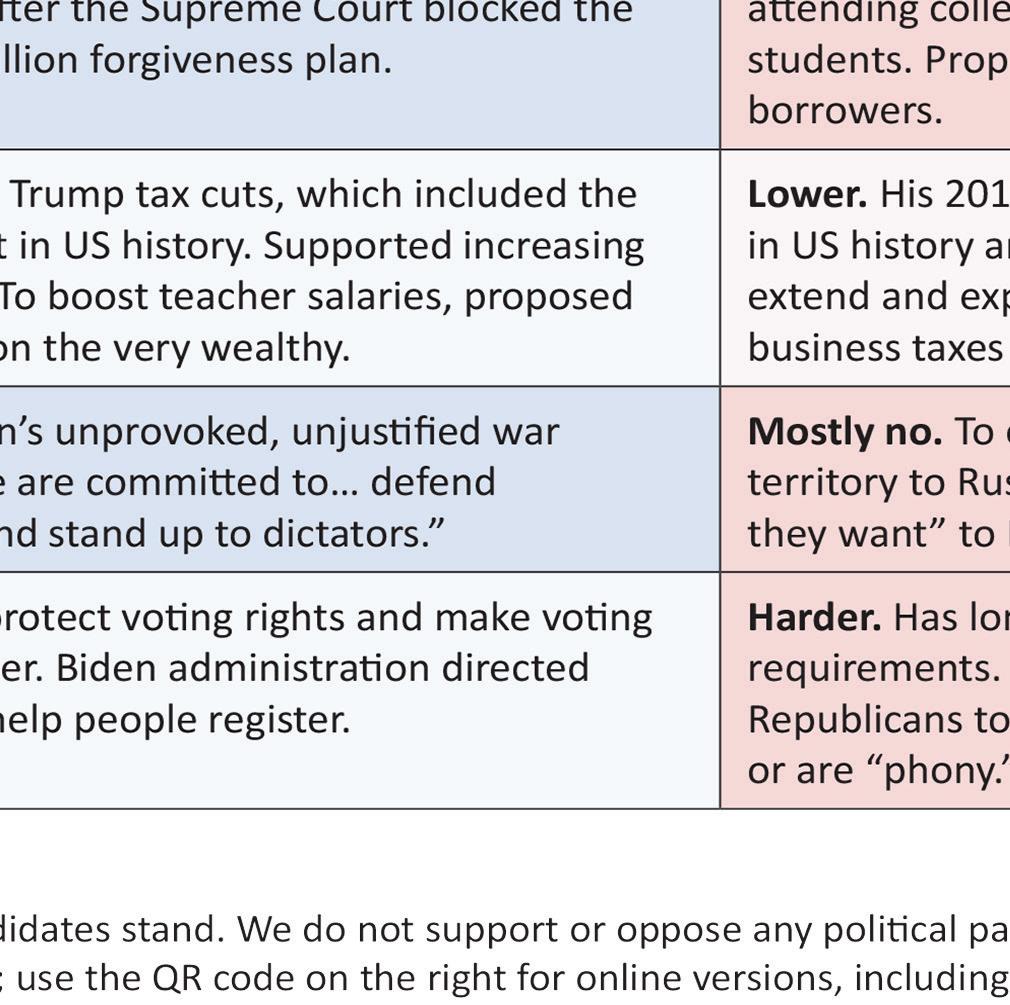
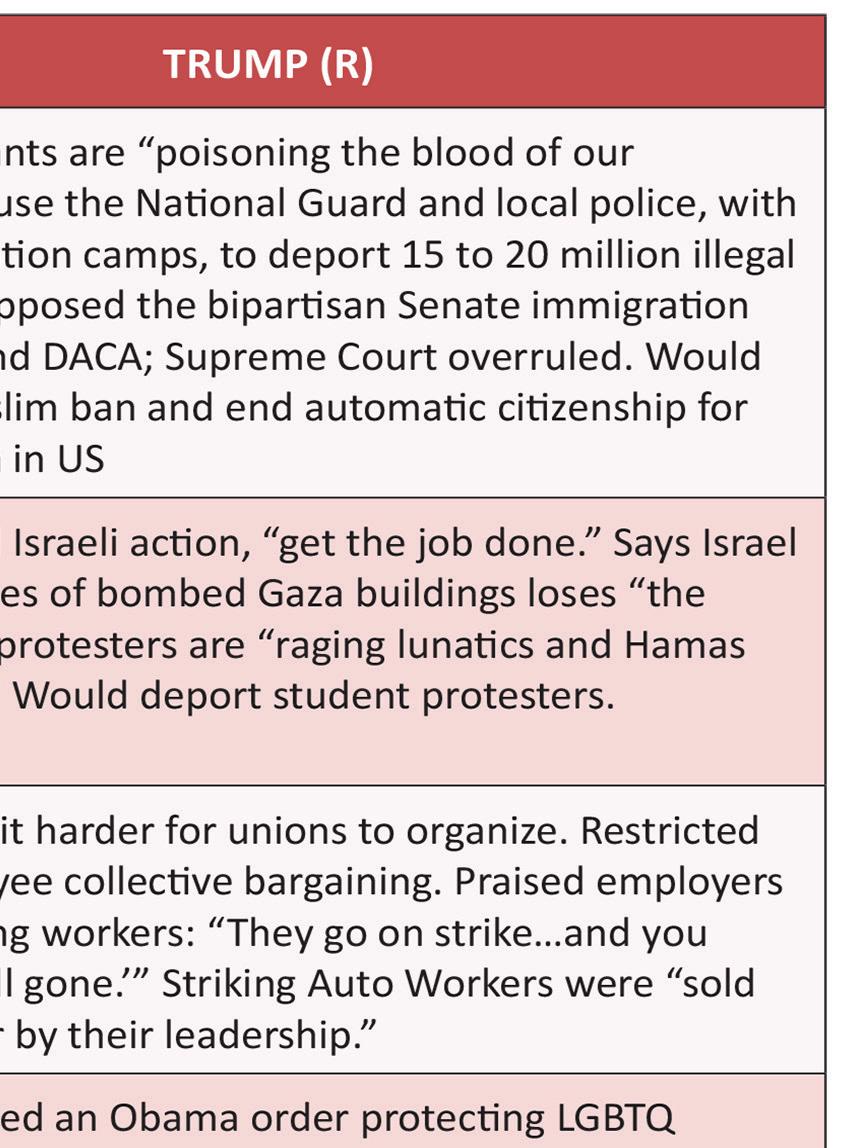
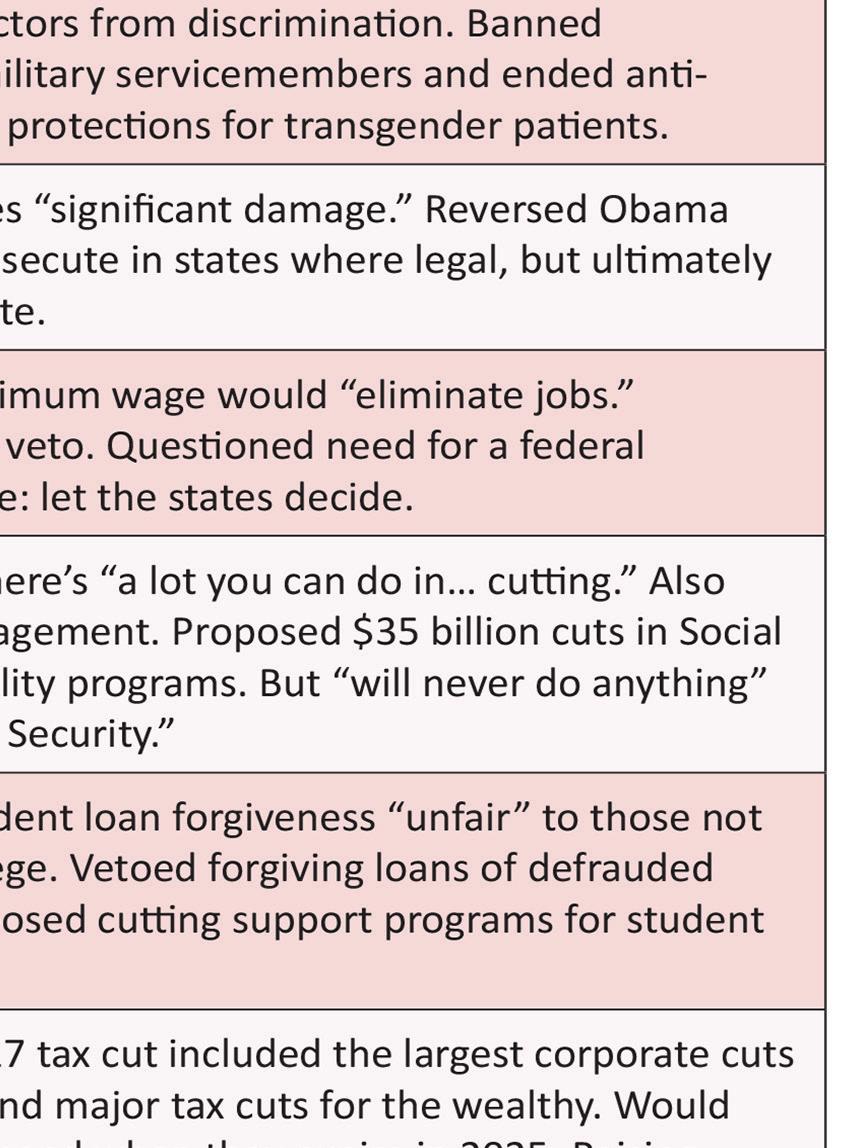

Groups emphasized env ironmental stewardship, immigration policy and reproductive justice
BY VIDYA PANDIARAJU | SENIOR REPORTER
DESIGN BY ANISH GARIMIDI
The Daily Pennsylvanian spoke with representatives from several campus cultural groups ahead of the Nov. 5 election to understand the issues that are most important to them as they head to the polls.
The DP spoke with representatives from Quechua at Penn, Natives at Penn, the Black Pre-Law Association, Lambda Alliance, and the Asian Pacific Student Coalition. Issues they highlighted as important include environmental stewardship, immigration policy, and reproductive justice.
College senior and Quechua at Penn President Valeria Andrango told the DP that environmental legislation and Indigenous communities’ role in these policies are important considerations for this election. She specifically highlighted environmental stewardship efforts and the potential impact of policy changes on these efforts, raising concerns about the lack of “intentional inclusion” of Indigenous voices in the legislation drafting process.
voices is] something that I really hope is taken into consideration with whoever is elected into office because it's definitely lacking as it currently stands,” Andrango told the DP.
College senior and former DP staffer Mollie Benn, who is a member of Natives at Penn and the Choctaw Nation of Oklahoma, agreed that environmental issues are of note in this election. She said her ideal platform would be one that was based on “divesting from oil and increasing engagement with more sustainable forms of energy but also being mindful of land usage.”
Benn also noted an “absence” of environmental
discourse as a whole in the current election cycle.
“I think it is a pretty contentious election, and so I think I understand why I haven’t been seeing [environmental policies] more, but I do notice that there hasn’t been as much attention paid to it,” she said.
Benn also reflected on the 100-year anniversary of Indigenous people gaining voting rights and emphasized the importance of protecting that right for those who may be dissuaded or barred from voting.
-
cies that are being pushed on either state levels, or even some federal levels, [that] restrict certain people from voting — especially minority groups and people living in rural areas,” she said.
Andrango also touched on the importance of immigration policy for a group like the Quechua, stressing the need for legislation and political sentiment that supports Indigenous languages and addresses the needs of undocumented community members. She called for accountability and urgency in providing legal support for immigrants and addressing the problem of missing Indigenous women.
The Black Pre-Law Association at Penn is also focusing on immigrationrelated policies in the upcoming election, as well as policies that address racial and ethnic inequality, according to College junior Olivia Reynolds.
hand personal impacts on our members, and we want to kind of make sure that the U.S. is sending a message that it’s supporting its key minorities in those demographics,” she told the DP.
Though BPLA is nonpartisan, Reynolds stressed the importance of civic engagement within the organization. The group
hosts an ongoing event with Comegys Elementary School to teach students about the Bill of Rights and democracy.
“We want to use our position at the unique intersection of being both a professional development group and a cultural affinity group to really emphasize a lot of these core issues that are at stake on the ballot this election, in terms of racial inequality and the like,” she said.
Lambda Alliance, the umbrella organization for on campus, is focusing on the importance of anti-discrimination platforms and policies, “especially as [their] community continues to face
legal challenges to equal rights in healthcare, education, and the workplace,” College junior and Lambda board member Alex Li wrote in a statement to the DP.
According to Li, Lambda also values the importance of the availability of healthcare and mental health resources, which he described as “essential” for the holistic health and wellness of the community. He also touched on the importance of open and available and books.
“We’re concerned about the impact of policies that may restrict open conidentities in schools and colleges, as these restrictions not only affect current students but also limit understanding and empathy across communities,” Li wrote.
The Asian Pacific Student Coalition focused on the importance of the impact of the war in Gaza on both their constituents and other groups with whom they
collaborate. College junior and APSC Vice Chair of Political Affairs Xue Jiang emphasized the importance of electing a candidate who would end the war.
College senior and APSC chair Taryn Flaherty noted the importance of reproductive justice as an election issue. Flaherty said that though Pennsylvania is “safe” given Pennsylvania Gov. Josh Shapiro’s public commitment to maintaining access to reproductive care, it is important to consider those in states with more restrictive policies when deciding for whom to vote.
Flaherty also highlighted APSC’s support of affirmative action in response to the Supreme Court’s ruling against the use of race in college admissions, which overturned decades of affirmative action in higher education.
how much of a disgrace it is for Asian American communities to be used and [pitted against] Black and brown communities,” Flaherty said.

Both groups indicated a large boost in members and engagement this semester compared to previous years
BY THEO GREENFIELD | STAFF REPORTER DESIGN BY JANINE NAVALTA
enn’s two largest student partisan political organizations, Penn Democrats and Penn College Republicans, have both reported noticeable increases in membership and participation in the lead-up to the 2024 presidential election, in which Pennsylvania is a critical battleground state.
PPENN DEMS
Penn Dems records participation in general body meetings. In fall 2023, the club told The Daily Pennsylvanian it had an average of about 25 attendees per meeting — this semester, it
reported tripling its attendance to 75 people.
College junior and Penn Dems President Ellie Goluboff-Schragger noted exceptional participation from first years.
“I think we’ve seen not just increased attendance at events, but increased commitment from, especially, the freshmen this year who seem really, really excited,”
Goluboff-Schragger told the DP.
Earlier this semester, Goluboff-Schragger said the club's focus would be to increase recruitment, as membership numbers typically decline in non-election years. Since then, the group has organized more events
to cater to the new students.
”To accommodate [the increase in turnout], we want to provide people with different forums, different mediums to then act upon their interest in a meaningful way,” College junior and Penn Dems Political Director Lucas Eisen said.
"We probably wouldn't be having this many events if there wasn't the attendance to go with it," GoluboffSchragger added.
The group has hosted several speaker events in the past semester, including with Pennsylvania attorney general candidate Eugene DePasquale and United Calif.), 1984 University of
Pennsylvania Carey Law School graduate Rep. Mary
sole grandson of former President John F. Kennedy and Vogue political correspondent Jack Schlossberg. Penn Dems has seen an increase in activity in previous election cycles. In 2022, it registered 615 Penn community members to vote through tabling events, which placed it as the top college Democrats organization to register students to vote in Pennsylvania.
COLLEGE REPUBLICANS
While College Republicans were unable to provide exact figures, its executive board has noticed a “massive increase in applications and engagement.”
between as low as two, but up to 10 or more members each week, ever since the start of the school year,” a College Republicans spokesperson told the DP. They specifically noted the participation of attendees, especially moderates, to learn and converse. The

club’s goal is to give members unbiased perspectives and access to information.
a little bit more moderate … really are just trying to engage with people on both sides of the spectrum,” the spokesperson said. “We’re also always happy to refer them to someone that we know in Penn Democrats so they can learn about the opposite viewpoint.”
The group also noted an increase in events and event participation, mentioning collaborations with different Penn organizations to bring people to Penn — such as former New Jersey Gov. Chris Christie and U.S. Senate candidate for Pennsylvania, Dave McCormick.
the Vote, Penn’s voting rate has trended about 10% above the national average since the 2018 midterm elections, but with a clear jump in on-campus voting rates in presidential election years. In 2020, 76.7% of students voted on campus, but that rate dropped down to 43.1% in 2022.

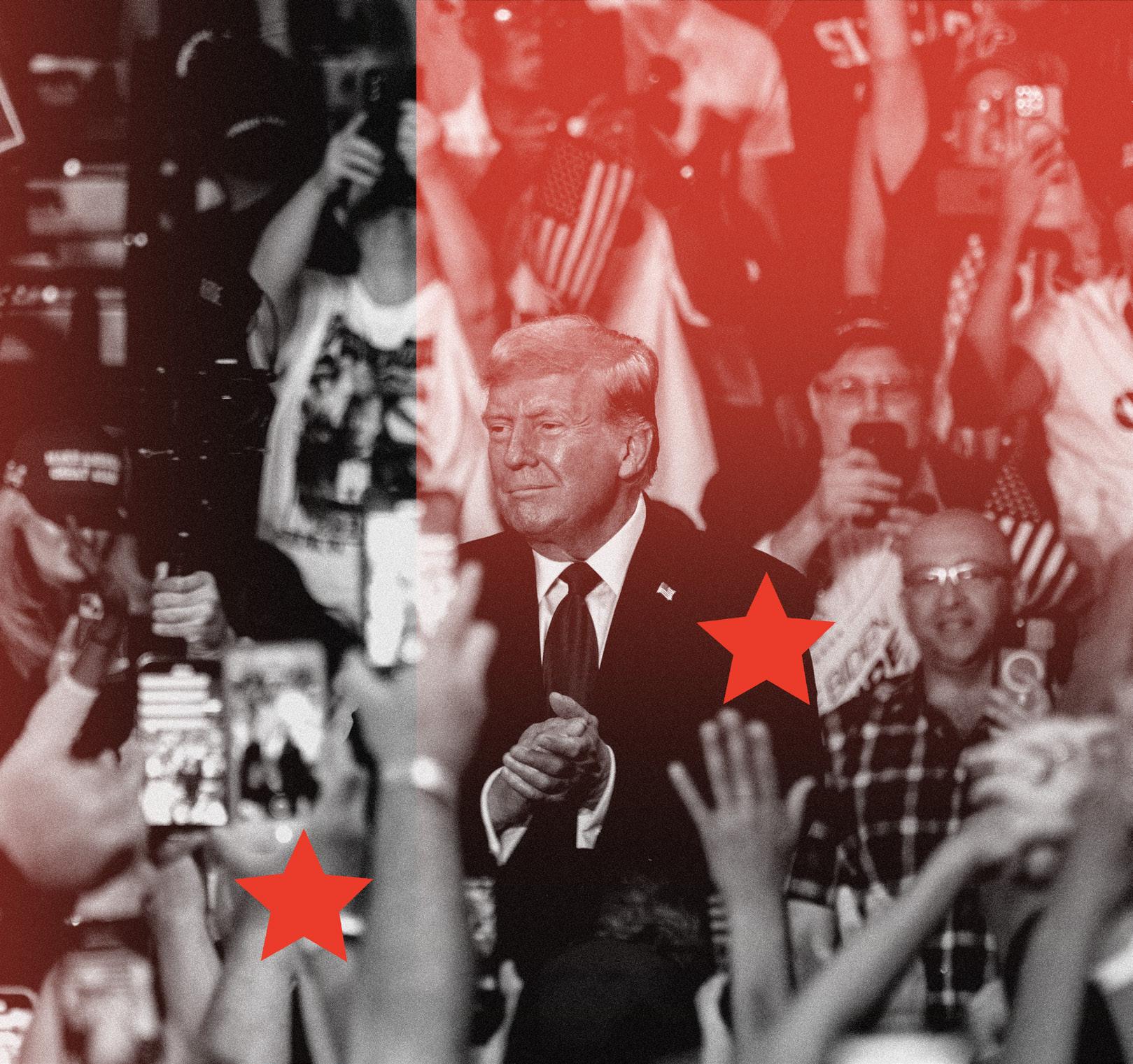
the “Ivy League” 20 times, often followed by statements like “I was a good student” or “You have to be smart to go there.” During the 2020 cycle, however, Trump mentioned “Ivy League” only once. This term has not resurfaced in his 2024 campaign.
Trump has aligned himself with the Republican Party’s broader stance this election cycle of distancing itself from — and critiquing — higher education, especially elite colleges and universities. At the Republican National Convention in July, graduates of the Ivy League took to the stage, decrying “the radicalism on our campuses” and the “deceit and lies” of prestigious institutions.
instances accompanied by anecdotes about Trump’s time as a student or assertions of the University’s prestige. Trump has frequently used the phrase “Wharton School of Finance,” though Wharton officially dropped “Finance” from its name in 1972.
In 2024, “Wharton” appeared 45 times, nearly tripling its 2020 mentions and surpassing its frequency in the 2016 campaign cycle. However, an analysis of these references indicates that Trump’s use of “Wharton” in recent speeches has focused less on his educational background and more on discussions related to economic policy or business acumen.
BY JASMINE NI AND SRISHTI BANSAL | SENIOR REPORTER AND STAFF REPORTER DESIGN BY INSIA HAQUE
n previous election cycles, former President and 1968 Wharton graduate Donald Trump has frequently mentioned his Ivy League credentials and affiliation with Penn. But as his third presidential campaign nears its end, data indicates that Trump is distancing himself from the University.
During his campaigns for the presidency in 2016 and 2020, Trump frequently invoked his Ivy League credentials and affiliation with Penn and the Wharton School — which he called the “Wharton School of Finance” during the presidential debate in
September — to underscore his business acumen and compare himself to his political opponents. However, a recent data analysis by The Daily Pennsylvanian reveals a marked shift in Trump’s messaging, with a decline in positive mentions of Penn.
The DP previously reported that in his first run for president, Trump referenced his Penn affiliation 93 times, incorporating terms such as “Penn,” “Wharton,” or “Ivy League” often in his campaign rhetoric. This approach continued, though much less prominently, during the 2020 election season when he referenced Penn 29 times. As an incumbent candidate, Trump mentioned his academic
background less frequently in his campaign rhetoric.
Since Nov. 15, 2022, in Trump’s third campaign for presidential office, he has mentioned “Penn” or the “University of Pennsylvania” 20 times. Out of these, all but four instances directly referred to the Penn Biden Center rather than his personal affiliation.
"Well, how about all theting from Penn … I went there, the Wharton School of Finance. It’s great. I went there. Penn, they givelions of dollars, and Biden gets paid a lot of money by the Chinese,” Trump said at a Richmond, Va. rally in March.
In 2016, Trump mentioned
“We’re also going to stand up to the radical left communists, Marxists, fascists, and frauds who have taken over our universities,” Trump said at a Durham, N.H. rally in December 2023. “They’ve destroyed the reputations of once highly respected schools like Harvard, MIT, Columbia, Stanford, University of Pennsylvania, the great Wharton School of Finance. It’s so sad to see it all happening.”
I WENT TO THE WHARTON SCHOOL OF FINANCE, AND MANY OF THE PROFESSORS THINK MY PLAN IS A BRILLIANT PLAN.
- Former President, 1968 Wharton graduate Donald Trump
Following media coverage of the Penn Biden Center and its links to former Penn professor and President Joe Biden’s administration, statements such as “Biden couldn’t get into Penn” and comments regarding alleged foreign influence in Penn’s funding have appeared in Trump’s speeches more frequently. As a result, his rhetoric around the University has taken on a more adversarial tone, in contrast with earlier mentions where he claimed Penn as his own.
Throughout the 2016 campaign cycle, “Wharton” alone was mentioned 41 times, with many of the
Trump has leveraged Wharton as his prestigious alma mater that informs his understanding of finance and economics as a tactic in debates and interviews throughout the 2024 campaign season. For example, the Penn Wharton Budget Model, a nonpartisan economic analysis initiative, has played a peripheral role in Trump’s campaign discussions. The PWBM, which assesses the economic impacts of various policy proposals, was cited in recent presidential and vice presidential debates as a source of fiscal projections.
Vice President Kamala Harris referenced PWBM’s findings in the September presidential debate that took place in Philadelphia, claiming that Trump’s economic plan would significantly increase the national deficit. In response, Trump mentioned his Wharton degree.
“I went to the Wharton School of Finance, and many of the professors … think my plan is a brilliant plan,” Trump said.
Donald Trump Jr. has become a well-known political figure — not only for his association with his father, 1968 Wharton graduate and former President Donald Trump, but also for his growing influence on the Republican Party.
Before his rise to political power, however, Trump Jr. received a bachelor’s degree in economics from the Wharton School, where he concentrated in marketing and real estate. The Daily Pennsylvanian spoke with several of Trump Jr.’s peers to paint a better picture of the man before the magnate.
In 2010, Trump Jr. visited Penn for a master’s degree in real estate series sponsored by the Wharton Undergraduate Real Estate Club. During the talk, Trump Jr. described himself as, 10 years ago, “the guy sitting in the back of this Huntsman lecture hall.”
2000 Wharton graduate Joel Spector has similar memories of Trump Jr. in the classroom.
“In that class, I remembered he was quiet,” Spector said. “He rarely spoke. He rarely, I don’t think, contributed anything to class. … I seem to remember he sat kind of like slouched in his chair. He always wore a baseball hat.”
Despite Trump Jr.’s quietness, other peers remember him as a good student. 2000 Wharton graduate Louis Antonetti said that Trump Jr. often had the “top grades in the class” as well as an “amazing work ethic.”
“For most kids, weekends in college start on Thursday right, maybe Wednesday,”
be coming back from the library with his bag over his shoulder while the rest of us started the weekend festivities a little early. He would have that discipline; he knew he was at Penn and didn’t want to squander that opportunity.”
In a 2004 interview with New York Magazine, Trump Jr. admitted that he “used to

The DP spoke with former peers of Tr ump in order to paint a better pic ture of Tr ump Jr.: the man before the magnate
BY CHARLOTTE COMSTOCK AND PAIGE RAWISZER | STAFF REPORTERS DESIGN BY INSIA HAQUE
drink a lot and party pretty hard” in college. At Penn, Trump Jr. was involved in the Phi Gamma Delta fraternity, which is colloquially known as Fiji.
Trump Jr. ultimately quit drinking in 2002.
Despite the article’s allegations, Arturo — a friend of Trump Jr.’s who requested to not be referred to by his full name due to fear of retaliation — shared that he “never witnessed anything” that supports the descriptions of Trump Jr.’s excessive partying.
Antonetti echoed Arturo’s comments on Trump Jr.’s partying, adding that Trump Jr. “didn’t do anything in college that was different from a normal college kid” and that he believes people’s “political views might influence their public opinion of what he was or is now.”
Arturo initially connected with Trump Jr. due to their shared background.
“We just found we had a lot in common,” he added.
“His mother was Czech, and I’m Polish, but I was taking Czech at Penn. We both
identified as sort of immigrants from that respect.”
He described Trump Jr. as outgoing, decent, and polite — someone down-to-earth with lots of friends.
Antonetti, who was also a brother of the Fiji fraternity, shared similar memories.
I DON’T THINK HE WAS DEAD SET ON GOING TO WORK FOR HIS FAMILY’S COMPANY. I THINK HE KNEW WHAT WAS COMING FOR HIM, BUT IT’S NOT LIKE HE TALKED ABOUT IT ALL THE TIME. I THINK HE WANTED HIS OWN INDIVIDUALITY.
- 2000
Wharton graduate Louis Antonetti
sandwich, and he borrowed a dollar,” explaining that Trump Jr. later repaid it and told Arturo that he “had no debts.”
He went on to state that he believes that Trump Jr.’s mother in particular played an important role in shaping him.
“People lose sight of the fact that he does have two parents,” he said. “I think the fact that his mother is from very big part of his identity. People critique his dad about being anti-immigration, but he was an immigrant himself.”
Antonetti recalls Trump Jr.’s mother, Ivana Trump, and father, Donald Trump, visiting him at Penn.
“His sister visited a few times, and we would all go out to dinner,” he said. “His dad was obviously pretty busy, but he was at graduation and at all the big events. They definitely had more of a family connection than people may think those with billionaire status have.”
“He would never try to hurt anybody,” he said. “He would never try to take advantage of anybody. But I can see that if people wanted something from him, whether it was attention or a status thing … maybe if he didn’t give that, then they would put him in a negative light.”
Antonetti also called Trump a “giver” who helped others out around the house, as well as with homework.
“He would give what he could, and he didn’t expect to take from people," Antonetti said.
He added that Trump was very “school-spirited” at Penn, always trying to rally his friends to be a part of school activities.
While Trump Jr. seemed to be passionate about fundraising for his chapter, he was careful with handling his own money, Arturo said.
“He always talked about having a $300-a-month allowance,” Arturo said. “Once, we were in line for a
On the other hand, Spector recalled a time when Trump came to give a speech at Penn and Trump Jr. did not show up. He remembers the former president complaining in his speech that his own son did not come to hear his father speak.
“Maybe it was indicative of his relationship with his father at the time,” Spector added.
Though Trump Jr. eventually went on to work for his family’s company, his path was not predestined, according to Antonetti.
“I don’t think he was dead set on going to work for his family’s company,” he said.
“I think he knew what was coming for him, but it’s not like he talked about it all the time. I think he wanted his own individuality.”
Arturo echoed Antonetti’s sentiments, recalling Trump Jr. interviewing for investment banking jobs like everyone else and going down the “normal path.”
“It’s funny, back then, I feel like politics wasn’t such a hot topic,” Antonetti said. “His father blazed the trail of the uncommon politician.”
Members of Penn's faculty have donated about $470,000 in political donations to federally registered political committees since the beginning of 2023
BY JIN KWON AND THEO GREENFIELD | SENIOR REPORTER AND STAFF REPORTER
Penn professors have donated nearly half a million dollars since the beginning of 2023 to federally registered political committees — with the vast majority going to Democratic causes.
An analysis conducted by The Daily Pennsylvanian of data obtained from the Federal Election Commission indicates that members of Penn's faculty gave about $470,000 in political donations to such political committees between Jan. 1, 2023 and Sept. 30, 2024. Around 99.1% of those donations went to Democratic candidates and Democraticaligned organizations.
The DP's analysis only counts individual contributions to federally registered political committees.
From Jan. 1, 2023 to Dec.
tween the midterm elections professors' donations totaled over $122,000. From the beginning of 2024 to Sept. 30, that number nearly tripled to almost $350,000.
Penn faculty donated only a little under $1,200 to WinRed, the fundraising platform for the Republican Party. In addition, Nikki Haley for President, the fundraising site for former South Carolina Gov. Nikki Haley, received about $1,300.
The Democratic Party’s grassroots fundraising platform, ActBlue, received almost $90,000 in donations.
Around 45% of all donations from Penn professors since the beginning of 2023 were made after former Benjamin Franklin Presidential Professor of Practice and President Joe Biden dropped out of the presidential race, with about
$215,000 donated since July 21. This includes $130,000 to the Harris Victory Fund, Vice President Kamala Harris’ campaign fund — which is believed to have set a record for the most money raised for a candidate so quickly after entering a race, at over $1 billion raised in less than three months.
The Harris for President fund — which raises money for both Harris' campaign and other Democratic initiatives around the country — received around $74,000 in donations.
One of the largest recorded individual contributions in a singular day — around $38,000 in late September — was by former Penn President Amy Gutmann, who recently announced a return to the United States and marked the opening of Penn's Amy Gutmann Hall.
Outside of the presidential campaigns, professors have
donated around $33,000 to is facing a contentious race against former hedge fund CEO Dave McCormick that may determine the balance of the U.S. Senate. The race with the next largest amount of donations from Penn faculty members was the New Jersey Senate race, in which
received $7,800 from Penn professors.
Much of the money raised by both presidential candidates has been spent in Pennsylvania. More than $538 million has been spent combined in advertising in the critical swing state by the million by the Democrats and $243.6 million by Republicans.
An analysis by the DP in October concluded that Harris’ campaign outspent former President and 1968 Wharton
graduate Donald Trump’s campaign on digital advertisements targeted to Penn’s ZIP code by around $36,000 since she became the Democratic nominee.
In 2022, Penn faculty donated $300,000 to political causes — the largest amount during a midterm election year to federally registered political committees. During those elections, 99.7% of political donations from Penn faculty went to Democrats.
During the most recent presidential election cycle in 2020, Penn faculty members donated over $1 million to Democratic candidates, the majority of which went to Biden’s campaign. These numbers were atypical from previous presidential election years, when Penn professors collectively donated an average of around $400,000 per year.


said.
equities.
Rep. Rick Krajewski talked about his time
udent and his reelection campaign in a DP interview
BY NICHOLAS MAHARAJ | STAFF REPORTER DESIGN BY KATRINA ITONA
Pennsylvania state Rep. Rick 2013 Engineer-
served as vice president.
TIME AT PENN AND EQUITABLE ACCESS TO HIGHER EDUCATION
tice.
ROLE IN THE GAZA SOLIDARITY ENCAMPMENT
STUDENTS’ RELATIONSHIP WITH PHILADELPHIA
Krajewski said.

Kamala Harris is the best choice
For the majority of undergraduate Penn students, this upcoming presidential
have a say in electing Donald Trump eight years ago, but we dealt — and grew up — with the consequences of his policies.
With the dire threat of another Trump presidency, the nation needs Kamala Harris.
That is why The Daily Pennsylvanian Editorial Board is endorsing Harris for president.
Harris offers a vision of stability and opportunity for all Americans, and her proposed policies reflect that commitment. Her economic plan to lower costs for middle-class families will remove barriers to access everyday necessities, like healthcare, housing, and groceries. She promises to prioritize workers and small business owners in the interest of creating jobs, revitalizing communities, and propelling innovation.
economic agenda includes extending tax cuts that mostly
benefit the wealthy and imposing tariffs that place the burden of higher prices on American consumers. As many Penn students prepare to join the labor force after graduation, issues like the rising cost of living, inflation and student loan repayment
policies threaten financial security and access to opportunities, for us and our fellow Americans.
Beyond the economy,
freedoms are also on the line. Trump praises himself for picking the Supreme Court justices who overturned Roe v. Wade, which caused millions of women to lose their right to an abortion and to make decisions about their sign a federal law restoring our reproductive freedoms demonstrates her commitment to defending our constitutional rights as president.
Her policies not only align with the issues young voters care about most, as reflected in a recent survey of over 900 Penn undergraduates by the DP, but they cater to what
America needs right now.
However, mere days away from the election, the assurance of a Harris presidency has yet to materialize. National polls show a neck-and-neck race to the finish, tied at 48 percent between Harris and Trump. The Editorial Board recognizes that some voters are still not thrilled or convinced by stances, but in this election, we are faced with more than a decision about policies. For the alternative candidate, acting in self-interest is all that he cares about.
34 felony counts for falsifying business records during his 2016 presidential campaign.
rather than gamble with it. A vote for her is a vote for leadership rooted in integrity.
THE GRAVITY OF THIS SITUATION IS PALPABLE AND REMARKABLY UNDENIABLE. WE, THE STUDENTS OF PENN, HAVE THE POWER TO MEET THIS MOMENT ON NOV. 5.
- The Daily Pennsylvanian Editorial Board
Trump cannot be persuaded away from his bigoted and authoritarian tendencies, which have prompted bomb threats in Springfield, Ohio, and an insurrection in our Capitol building. In May, he was convicted on
The rhetoric of his campaign is defined by hate and prejudice against marginalized communities. Just this Sunday, speakers at a Trump rally in New York City exemplified the messaging of his political movement: racist comments, later labeled as targeting groups across various races, ethnicities and religions. This constant divisiveness and intolerance is unacceptable.
By contrast, Harris has demonstrated empathy and a humanity that is embodied by her middle class upbringing with immigrant parents who fought for fundamental freedoms. She is the choice who will protect American democracy
also not lose sight of the privilege to be in a state where our vote truly matters. Philadelphia and Pennsylvania are at the forefront of the national stage. In just the past week, political campaign activity and celebrity appearances on campus have been rampant, not to mention throughout the entire semester. The gravity of this situation is palpable and remarkably undeniable. We, the students of Penn, have the power to meet this moment on Nov. 5.
As the newest group of voters in America, we now have the chance to prevent an choice, Penn.
Editorials represent the majority view of members of The Daily Pennsylvanian, Inc. Editorial Board, which meets regularly to discuss issues relevant to Penn's campus. Participants in these meetings are not involved in the reporting of articles on related topics. Reach us at edboardchair@ dailypennsylvanian.com.
Guest Column | Here is why you should too
oting in Pennsylvania for 1968 Wharton graduate Donald Trump or Jill Stein (both endorsed by members of the Ku Klux Klan) will not help Palestinians or change American foreign policy. If you care about Palestine and are disgusted by the funding and support for the bombing of Gaza, annexation of the West Bank, criminalization of Palestinian Israelis, and invasion of Lebanon, get organized, involved, and donate to mutual aid. As a Palestinian living in Pennsylvania, this is why I voted for Vice President Kamala Harris.
VI grew up in a whirlwind of checkpoints, olive trees, Al-Jazeera, cool Jerusalem stone, my loving familial enclave of Birzeit, Palestine, and American public schools that empowered my belief in radical change, as exhibited by founders of modern American voting and activism like Rosa Parks, Harriet Trudell, and Sojourner Truth.
My parents modeled voting once they became American citizens: They took me into their booths to vote for Hillary Clinton and President Joe Biden. They taught me that my American vote was a chance to push the United States in the right direction, even if I didn’t have the privilege of voting for a candidate who supports and reflects all my needs. Nonetheless, the practice of voting for candidates who push America in the right direction is what I can do with my great, hard-fought privilege. As I came of voting age, I knew I would never get the chance to vote if I voted purely on my first love, Palestine.
I voted in this election for the candidate who objectively can win with my vote — one who has moved politically on Palestine. I trust Harris will continue to do so and that she will make the standard of living for the average American better. I voted to protect the right to critique politicians without being criminalized. I voted for a vice president who wrote his master’s thesis
on genocide, how to teach students to identify genocide, and how to stand up to ensure it never happens again. I voted to make the cost of a home more affordable, for tax credits that will help families feed their kids, and for the protection of religious rights.
If you care about Palestine, withholding your support from Harris is a cheap copout from true support for Palestine. It endangers our hard-won right to vote. Be outraged by the murder and pillaging of Palestinians’ lives. Let this moment expand your world view of humanity, foreign policy, and America. Let this moment be the one you get involved in. Join the Philly Palestine Coalition, Philadelphia Parents for Palestine, Families for Ceasefire Philly,
Standing Together, Jewish Voice for Peace, Shut Down Ghost Robotics, and your university’s organization that is working in support of Palestine. Arm yourself with education: Read and spread Palestinian narratives, stories, and art.
To Stein and third-party voters, I ask you to see the way she is exploiting Palestinian tragedy to advance her political career. The United States lacks a solid third-party movement to fall back upon that would fundamentally change the unfair two-party system. In the same way the Democratic Party demonized Black voters for not voting, those who vote for Stein endanger Palestinian Americans: We will be blamed for another Trump presidency,
anti-Palestinian and Arab racism will increase, and supplemented by the hatred that Trump’s second presidency will bring, Islamophobia will skyrocket.
If you really care about Palestinians, listen to this Palestinian: Don’t repost another image on social media and withhold your powerful vote from Harris in Pennsylvania — get involved in changing Pennsylvania for good. Vote for progressive candidates who will push for Palestinian rights on a state and federal scale. Help combat the militarization of Philadelphia and Pennsylvania State Police that has shocking parallels with Israel. With expansive and large enough movements in Pennsylvania, we can kick weapons manufacturers out,
stop the sale of weapons to Israel, and change American foreign policy. We can’t do that with a setback on Nov. 5. You endanger yourself, Arab Americans, Muslims, Palestinians, and progressive activists when you choose to inhibit Harris from winning Pennsylvania. If you live in Pennsylvania and care about Palestine, don’t be the reason a self-proclaimed future dictator and rapist becomes president again.
SELMA FARSAKH is a College junior studying gender history and philosophy, politics, and economics. She serves as the diversity and coalitions director of Penn Dems. Her email is selmaulm@sas.upenn.edu.
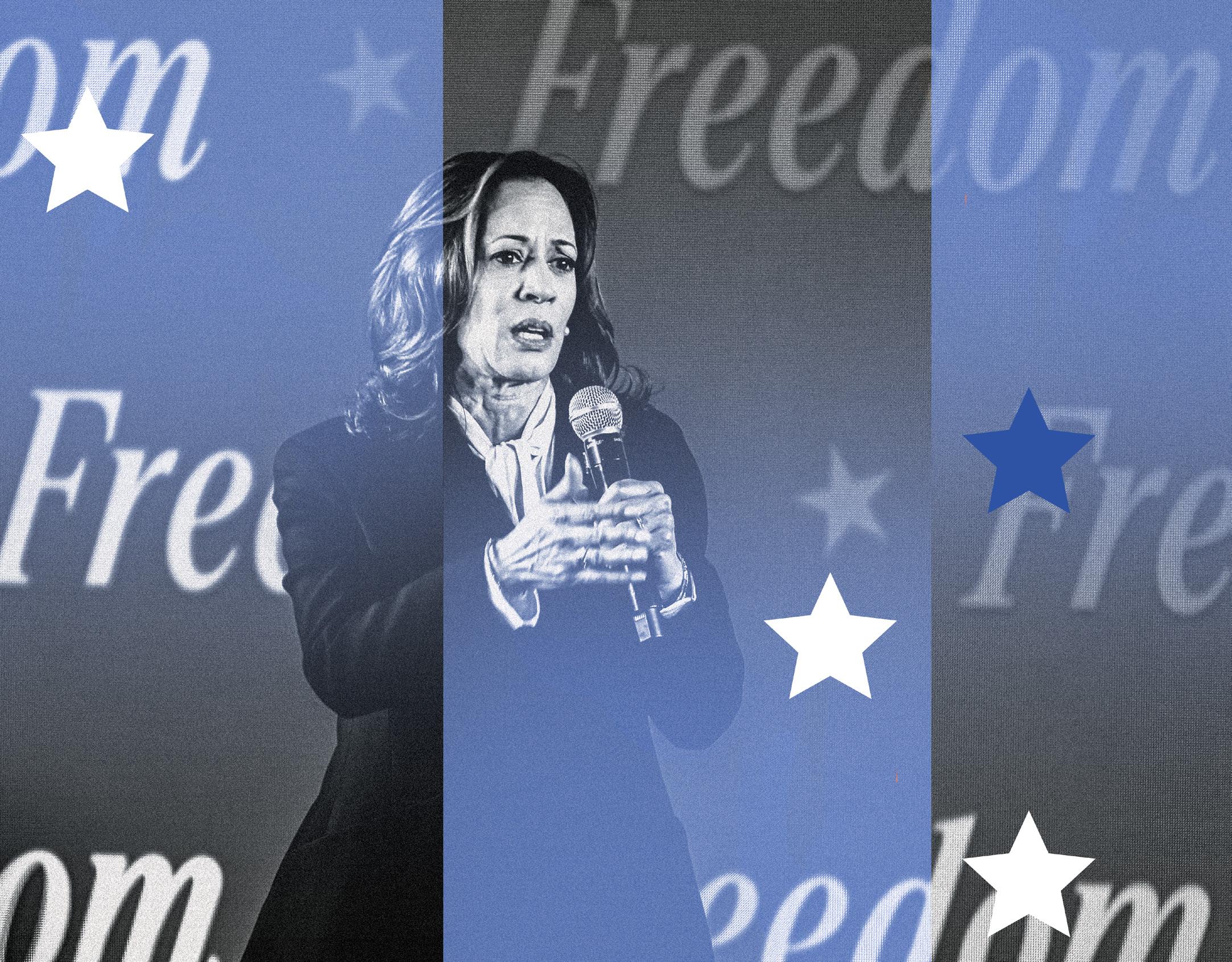
The clock is ticking, Pennsylvania. With the voter registration deadline now behind us and Election Day just under a week away, the importance of this election looms large. For many voters, the decision is made, ballots are filled out, and the campaign ads are simply background noise.
the electorate that are undecided, every ad, debate, and headline still matters. In what could be one of the closest presidential races in modern history, this sliver of the voters has the power to decide who will lead the nation for the next four years.
It’s not surprising that both campaigns are hammering away at economic issues. With inflation, gas prices, and unemployment affecting daily life, can -
voters cite the economy as being very important to their decision in the election. Kamala Harris and Donald Trump ads flood the airwaves, each promising economic stability, growth, and support for the middle class. Yet, here’s the problem: If the economy hasn’t already won over these undecided voters, it might not be the tipping point after all. Perhaps what this final group needs is a focus on issues that haven’t been on the media’s center stage but still have a direct impact on our lives.
Let’s consider an issue that will outlast any single presidential cycle: U.S. Supreme Court appointments. In recent years, the court has reshaped American life with decisions that will reverberate for generations.
The overturning of Roe v. Wade in 2022, stripping federal protections for abortion, and the end of affirmative action in college admissions in Students for Fair Admissions v. Harvard and v. UNC were seismic shifts in U.S.
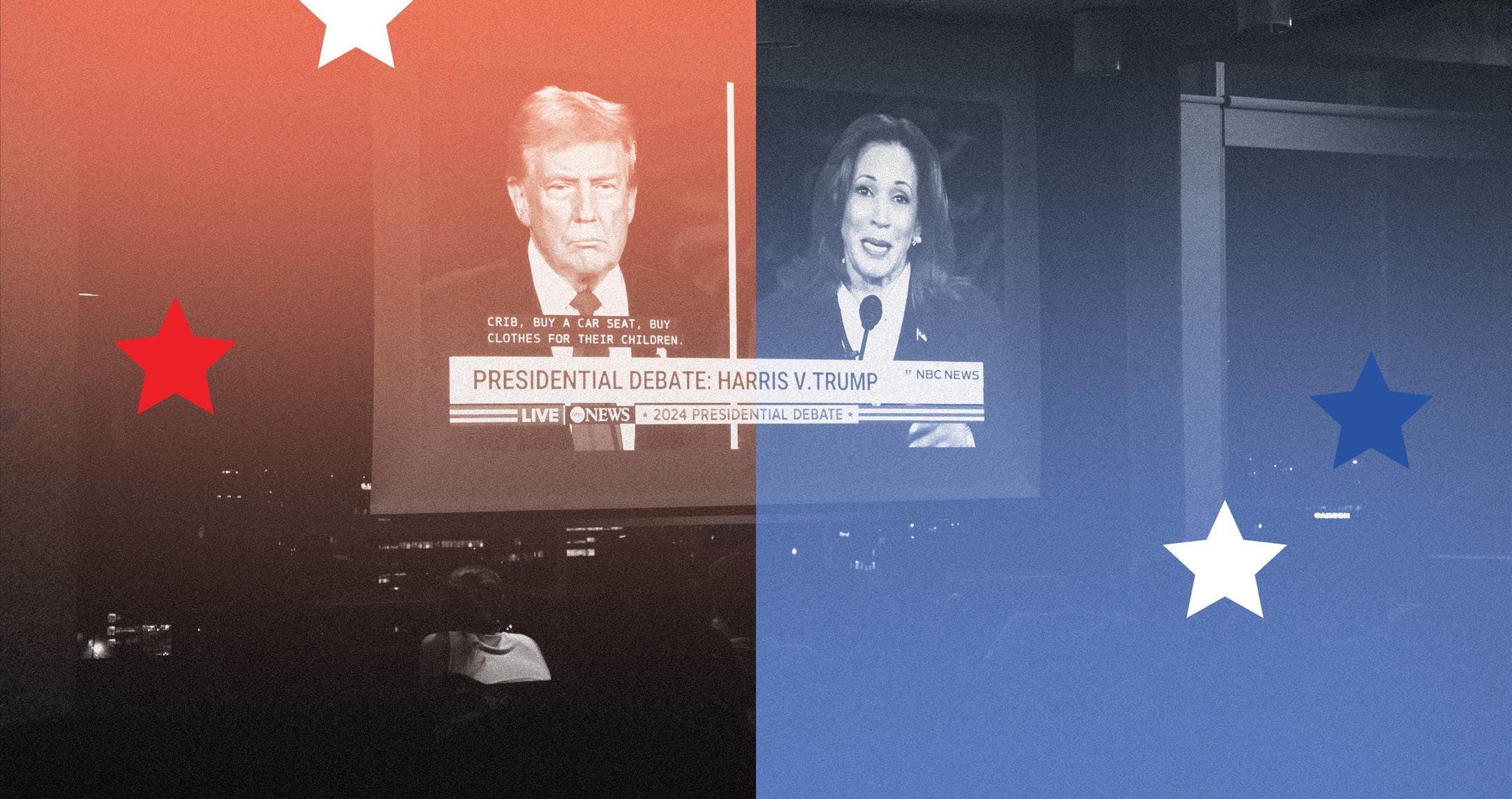
policy. These rulings weren’t just headlines: They were deep, structural changes.
And yet, despite these monumental decisions, the Supreme Court has gotten little to no coverage in this election cycle. The role of the Supreme Court is rarely the focal point of campaign discussions, but make no mistake — whoever sits in the Oval Office will also shape the court. Justice Clarence Thomas and Justice Samuel Alito, both in their 70s, are likely approaching retirement, giving the next president a chance to appoint successors who will shape the court's ideological balance for de-
increase in rulings aligned along party lines — the highest in history — the polarization within the court should give voters pause.
And let’s not forget climate change, the elephant in the room that neither campaign seems too eager to address head-on. With the increasing frequency and severity of extreme weather seen with Hurricanes Helene and Milton, the gravity of the effects of
climate change is beginning to affect the American electorate’s day-to-day lives.
During their last debate, Harris dedicated a mere one minute and 44 seconds to environmental policy, while Trump gave it just one minute and 31 seconds. This is baffling considering that a majority of Americans believe that climate change is already causing harm today. Yet, both candidates have skirted around comprehensive environmental policies, seemingly hesitant to make firm commitments that could alienate key swing voters.
IN CASTING A BALLOT, YOU HAVE THE CHANCE TO DEMAND ATTENTION TO ISSUES THAT TRULY MATTER TO YOUR GENERATION'S FUTURE.
The silence on climate change may be strategic, but it’s also shortsighted.
Rising temperatures, intensifying storms, and an unpredictable environment will affect everything from our economy to our infrastructure and health. For young undecided voters in particular, the consequences of climate inaction are real and urgent. If there were ever an issue that could define a generation’s trust — or mistrust — in government, this is it.
As voters, the question becomes: How can we bring focus to these issues if candidates won’t? When climate change and Supreme Court appointments impact your future job market, education, and quality of life, they deserve your voice and your vote. In casting a ballot, you have the chance to demand attention to issues that truly matter to your generation's future.
So, as Election Day looms, these undecided voters should be asking themselves a few big-picture questions. Do we want leaders who will view Supreme Court appointments as political pawns, or do we demand a commitment to judicial impartiality? And when
it comes to the climate, do we want an administration willing to face the climate crisis head-on, or one that keeps kicking the can down the road?
As Penn students, you’re not just spectators to this election; you're participants whose votes could genuinely influence the future. In a state as critical as Pennsylvania, where every ballot counts, the issues on the table directly affect the lives you'll step into after graduation. Supreme Court appointments and climate policy might seem like distant topics, but they’re shaping the world where you’ll work, live, and build families.
These questions should guide undecided voters to think about the kind of legacy they want their vote to leave — not just in the next four years, but for future generations.
ANANYA SHAH is a College first year studying philosophy, politics, & economics from Bonaire, Ga. Her email is aoshah@sas.upenn.edu.

Columnist Sose Hovannisian stresses the importance of all eligible Penn students voting in the
Sose's Stance | From University City to the White House: Penn's pivotal role in the 2024 presidential election
There's something extraordinary about calling Pennsylvania home during an election year. To be at the epicenter of American democracy, where every vote carries the weight of history, is an unparalleled opportunity. In 2020, Pennsylvania didn't just participate in choosing the president — it was the decisive battleground where the votes determining the nation's trajectory amounted to fewer people than can fit in the MetLife Stadium. As we approach another pivotal election, our state once again finds itself in the global spotlight. As someone who has always been interested in civic engagement and public participation in democracy, I was ecstatic when I first changed my voter registration my first year. Back home in Los Angeles, my vote would join millions of others in a reliably blue state. But here in Pennsylvania, where elections can hinge on a handful of votes per precinct, every ballot takes on profound significance. The decision
to change my registration wasn't just about electoral strategy — it was about embracing my role as a member of the Philadelphia community.
As Penn students, we have the unique opportunity to make our voices heard in one of the most consequential battleground states in America. Pennsylvania has been decided by razor-thin margins in recent presidential elections, with just 80,555 votes determining the outcome in 2020. While many of us maintain close ties to our home states, the reality is that our votes may have far greater impact here in Pennsylvania.
Living in University City means we're not just temporary visitors — we're Pennsylvania residents for most of the year. We walk these streets, support local businesses, and are directly affected by state and local policies. Pennsylvania election law clearly states that college students can register to vote using their school address. The process is simple (though the deadline has already passed): You can register online in just a few minutes
through the Pennsylvania Department of State website or sign up with the many Penn students canvassing on Locust Walk.
Even from across the Atlantic in London, where I'm studying abroad this semester, my commitment to Pennsylvania democracy remains steadfast. I began my voting journey months ahead by requesting an absentee ballot using my Penn campus address. The process, while detailed, proved straightforward with proper guidance. My first step came on Aug. 1, when the Penn Abroad office directed me to the Center for U.S. Voters Abroad. There, I completed the Federal Post Card Application — a digital form essential for United States citizens voting from overseas — and submitted it to my county's election specialist.
The process moved efficiently from there: The Philadelphia County Election Office verified and approved my registration on Aug. 28. Right on schedule, 46 days before Election Day on Sep. 20, the Pennsylvania Department of State emailed me comprehensive instructions for
accessing and submitting my ballot. A separate email contained my secure, password-protected electronic ballot and related materials. Following the detailed instructions, I printed my ballot, cast my vote, and carefully prepared it for international shipping using the provided, prepaid envelope.
Knowing that absentee ballots must reach the county election office by 8 p.m. on Nov. 5, I mailed mine well in advance on Oct. 16. My civic duty was complete when, on Oct. 24, I received confirmation from the Commonwealth of Pennsylvania that my ballot had been received and processed — proof that distance need not prevent democratic participation.
Casting my vote from a London flat, an ocean away from Philadelphia, was a uniquely powerful experience. Though the process demanded careful attention to detail, the clear instructions made navigating the international voting procedure surprisingly manageable. The physical distance from Pennsylvania — some 3,500 miles — only strengthened my resolve
to participate in this pivotal democratic moment.
If I could ensure my voice was heard from across the Atlantic, then I hope you'll feel inspired to take that short walk to your designated polling location, whether it's Houston Hall or ARCH, to exercise your own right to vote. After all, democracy thrives on participation, whether from across the ocean or just across campus.
As young voters, we will live with the consequences of these decisions for decades to come. And as Pennsylvania residents for most of the year, we have both the right and opportunity to make our voices heard in this crucial swing state. Don't let this chance to participate in such a consequential election pass you by — vote in Pennsylvania today and be part of shaping our nation's future.
SOSE HOVANNISIAN is a College junior majoring in communication and minoring in history and consumer psychology from Los Angeles. Her email is sosehova@ sas.upenn.edu.
